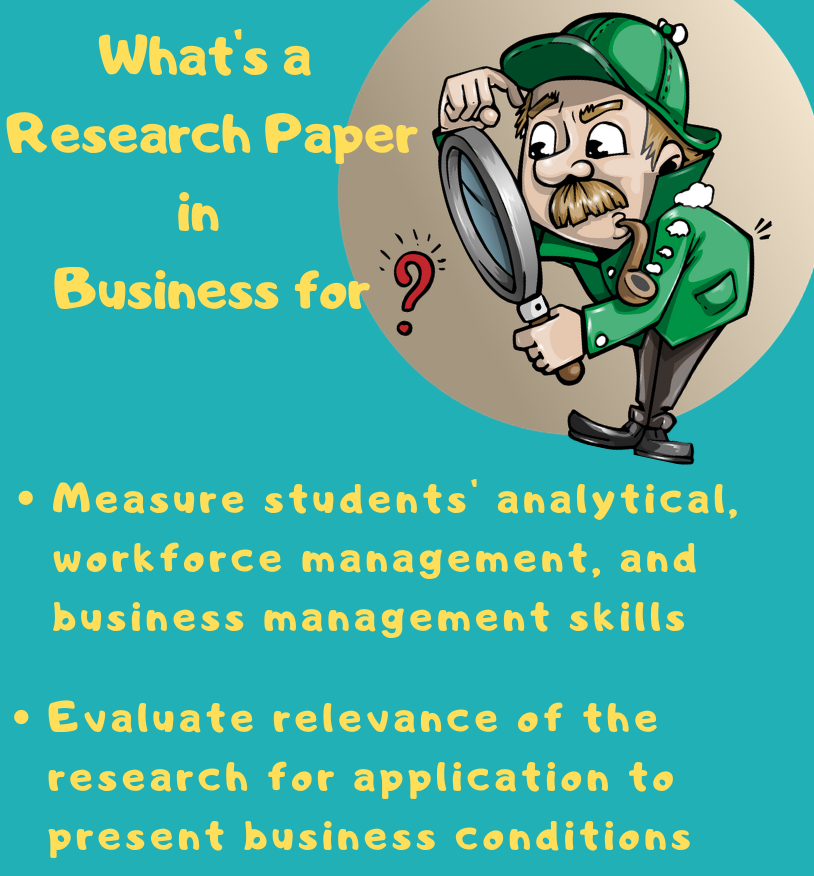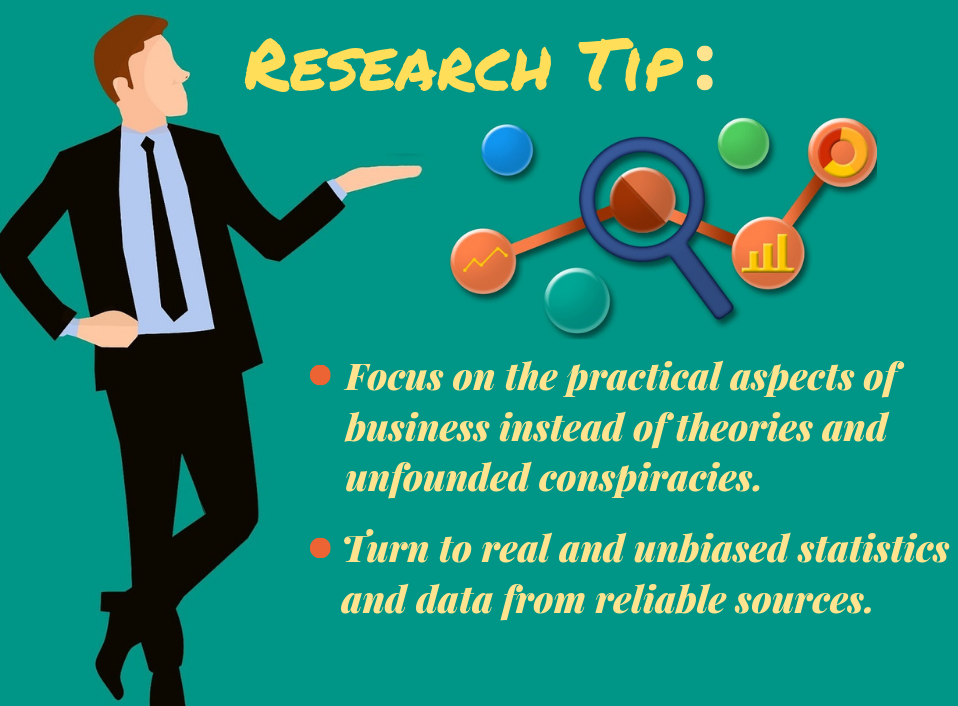- Privacy Policy

Home » 500+ Business Research Topics

500+ Business Research Topics

Business research is an essential component of any successful organization, as it allows companies to make informed decisions based on data-driven insights. Whether it’s market research to identify new opportunities, or analyzing internal processes to improve efficiency, there are a vast array of business research topics that companies can explore. With the constantly evolving business landscape, it’s critical for organizations to stay up-to-date with the latest research trends and best practices to remain competitive. In this post, we’ll explore some of the most compelling business research topics that are currently being studied, providing insights and actionable recommendations for businesses of all sizes.
Business Research Topics
Business Research Topics are as follows:
- The impact of social media on consumer behavior
- Strategies for enhancing customer satisfaction in the service industry
- The effectiveness of mobile marketing campaigns
- Exploring the factors influencing employee turnover
- The role of leadership in organizational culture
- Investigating the relationship between corporate social responsibility and financial performance
- Assessing the impact of employee engagement on organizational performance
- The challenges and opportunities of global supply chain management
- Analyzing the effectiveness of e-commerce platforms
- Investigating the impact of organizational culture on employee motivation
- The role of corporate governance in ensuring ethical business practices
- Examining the impact of digital marketing on brand equity
- Strategies for managing diversity and inclusion in the workplace
- Exploring the effects of employee empowerment on job satisfaction
- The role of innovation in business growth
- Analyzing the impact of mergers and acquisitions on company performance
- Investigating the impact of workplace design on employee productivity
- The challenges and opportunities of international business expansion
- Strategies for managing talent in the knowledge economy
- The role of artificial intelligence in transforming business operations
- Examining the impact of customer loyalty programs on retention and revenue
- Investigating the relationship between corporate social responsibility and brand reputation
- The role of emotional intelligence in effective leadership
- The impact of digital transformation on small and medium-sized enterprises
- Analyzing the effectiveness of green marketing strategies
- The role of entrepreneurship in economic development
- Investigating the impact of employee training and development on organizational performance
- The challenges and opportunities of omnichannel retailing
- Examining the impact of organizational change on employee morale and productivity
- The role of corporate social responsibility in attracting and retaining millennial talent
- Analyzing the impact of employee motivation on organizational culture
- Investigating the impact of workplace diversity on team performance
- The challenges and opportunities of blockchain technology in business operations
- Strategies for managing cross-functional teams
- The role of big data analytics in business decision-making
- Examining the impact of corporate social responsibility on customer loyalty
- Investigating the relationship between corporate social responsibility and employee engagement
- The impact of social media marketing on customer engagement and brand loyalty.
- The effectiveness of AI in improving customer service and satisfaction.
- The role of entrepreneurship in economic development and job creation.
- The impact of the gig economy on the labor market.
- The effects of corporate social responsibility on company profitability.
- The role of data analytics in predicting consumer behavior and market trends.
- The effects of globalization on the competitiveness of small businesses.
- The impact of e-commerce on traditional brick-and-mortar retail.
- The role of emotional intelligence in leadership and team management.
- The effects of workplace diversity on employee productivity and satisfaction.
- The role of corporate culture in employee retention and satisfaction.
- The impact of employee training and development on company performance.
- The effectiveness of performance-based pay structures on employee motivation.
- The impact of sustainability practices on company reputation and profitability.
- The effects of artificial intelligence on job displacement and the future of work.
- The role of innovation in the growth and success of small businesses.
- The impact of government regulations on business operations and profitability.
- The effects of organizational structure on company performance and efficiency.
- The role of emotional labor in service industries.
- The impact of employee empowerment on job satisfaction and retention.
- The effects of workplace flexibility on employee productivity and well-being.
- The role of emotional intelligence in negotiation and conflict resolution.
- The impact of branding on consumer behavior and purchase decisions.
- The effects of customer experience on brand loyalty and advocacy.
- The role of storytelling in marketing and advertising.
- The impact of consumer psychology on pricing strategies and sales.
- The effects of influencer marketing on consumer behavior and brand loyalty.
- The role of trust in online transactions and e-commerce.
- The impact of product design on consumer perception and purchasing decisions.
- The effects of customer satisfaction on company profitability and growth.
- The role of social entrepreneurship in addressing societal problems and creating value.
- The impact of corporate governance on company performance and stakeholder relations.
- The effects of workplace harassment on employee well-being and company culture.
- The role of strategic planning in the success of small businesses.
- The impact of technology on supply chain management and logistics.
- The effects of customer segmentation on marketing strategies and sales.
- The role of corporate philanthropy in building brand reputation and loyalty.
- The impact of intellectual property protection on innovation and creativity.
- The effects of trade policies on international business operations and profitability.
- The role of strategic partnerships in business growth and expansion.
- The impact of digital transformation on organizational structure and operations.
- The effects of leadership styles on employee motivation and performance.
- The role of corporate social activism in shaping public opinion and brand reputation.
- The impact of mergers and acquisitions on company performance and stakeholder value.
- The effects of workplace automation on job displacement and re-skilling.
- The role of cross-cultural communication in international business operations.
- The impact of workplace stress on employee health and productivity.
- The effects of customer reviews and ratings on online sales and reputation.
- The role of competitive intelligence in market research and strategy development.
- The impact of brand identity on consumer trust and loyalty.
- The impact of organizational structure on innovation and creativity
- Analyzing the effectiveness of virtual teams in global organizations
- The role of corporate social responsibility in crisis management
- The challenges and opportunities of online marketplaces
- Strategies for managing cultural diversity in multinational corporations
- The impact of employer branding on employee retention
- Investigating the impact of corporate social responsibility on investor behavior
- The role of technology in enhancing customer experience
- Analyzing the impact of social responsibility initiatives on customer satisfaction
- Investigating the impact of supply chain disruptions on business performance
- The role of business ethics in organizational decision-making
- The challenges and opportunities of artificial intelligence in customer service
- Strategies for managing employee burnout and stress in the workplace.
- Impact of social media on consumer behavior and its implications for businesses.
- The impact of corporate social responsibility on company performance.
- An analysis of the relationship between employee satisfaction and customer loyalty.
- The effect of advertising on consumer behavior.
- A study on the effectiveness of social media marketing in building brand image.
- The impact of technological innovations on business strategy and operations.
- The relationship between leadership style and employee motivation.
- A study of the effects of corporate culture on employee engagement.
- An analysis of the factors influencing consumer buying behavior.
- The effectiveness of training and development programs in enhancing employee performance.
- The impact of global economic factors on business decision-making.
- The role of organizational communication in achieving business goals.
- The relationship between customer satisfaction and business success.
- A study of the challenges and opportunities in international business.
- The effectiveness of supply chain management in improving business performance.
- An analysis of the factors influencing customer loyalty in the hospitality industry.
- The impact of employee turnover on organizational performance.
- A study of the impact of corporate governance on company performance.
- The role of innovation in business growth and success.
- An analysis of the relationship between marketing and sales performance.
- The effect of organizational structure on employee behavior.
- A study of the impact of cultural differences on business negotiations.
- The effectiveness of pricing strategies in increasing sales revenue.
- The impact of customer service on customer loyalty.
- A study of the role of human resource management in business success.
- The impact of e-commerce on traditional brick-and-mortar businesses.
- An analysis of the relationship between employee empowerment and job satisfaction.
- The effectiveness of customer relationship management in building brand loyalty.
- The role of business ethics in corporate decision-making.
- A study of the impact of digital marketing on consumer behavior.
- The effect of organizational culture on employee turnover.
- An analysis of the factors influencing employee engagement in the workplace.
- The impact of social media on business communication and marketing.
- A study of the relationship between customer service and customer loyalty in the airline industry.
- The role of diversity and inclusion in business success.
- The effectiveness of performance management systems in improving employee performance.
- The impact of corporate social responsibility on employee engagement.
- A study of the factors influencing business expansion into new markets.
- The role of brand identity in customer loyalty and retention.
- The effectiveness of change management strategies in organizational change.
- The impact of organizational structure on organizational performance.
- A study of the impact of technology on the future of work.
- The relationship between innovation and competitive advantage in the marketplace.
- The effect of employee training on organizational performance.
- An analysis of the impact of online reviews on consumer behavior.
- The role of leadership in shaping organizational culture.
- The effectiveness of talent management strategies in retaining top talent.
- The impact of globalization on small and medium-sized enterprises.
- A study of the relationship between corporate social responsibility and brand reputation.
- The effectiveness of employee retention strategies in reducing turnover rates.
- The role of emotional intelligence in leadership and employee engagement.
- The impact of digital marketing on customer behavior
- The role of organizational culture in employee engagement and retention
- The effects of employee training and development on organizational performance
- The relationship between corporate social responsibility and financial performance
- The impact of globalization on business strategy
- The importance of supply chain management in achieving competitive advantage
- The role of innovation in business growth and sustainability
- The impact of e-commerce on traditional retail businesses
- The role of leadership in managing change in organizations
- The effects of workplace diversity on organizational performance
- The impact of social media on brand image and reputation
- The relationship between employee motivation and productivity
- The role of organizational structure in promoting innovation
- The effects of customer service on customer loyalty
- The impact of globalization on small businesses
- The role of corporate governance in preventing unethical behavior
- The effects of technology on job design and work organization
- The relationship between employee satisfaction and turnover
- The impact of mergers and acquisitions on organizational culture
- The effects of employee benefits on job satisfaction
- The impact of cultural differences on international business negotiations
- The role of strategic planning in organizational success
- The effects of organizational change on employee stress and burnout
- The impact of business ethics on customer trust and loyalty
- The role of human resource management in achieving competitive advantage
- The effects of outsourcing on organizational performance
- The impact of diversity and inclusion on team performance
- The role of corporate social responsibility in brand differentiation
- The effects of leadership style on organizational culture
- The Impact of Digital Marketing on Brand Equity: A Study of E-commerce Businesses
- Investigating the Relationship between Employee Engagement and Organizational Performance
- Analyzing the Effects of Corporate Social Responsibility on Customer Loyalty and Firm Performance
- An Empirical Study of the Factors Affecting Entrepreneurial Success in the Technology Sector
- The Influence of Organizational Culture on Employee Motivation and Job Satisfaction: A Case Study of a Service Industry
- Investigating the Impact of Organizational Change on Employee Resistance: A Comparative Study of Two Organizations
- An Exploration of the Impact of Artificial Intelligence on Supply Chain Management
- Examining the Relationship between Leadership Styles and Employee Creativity in Innovative Organizations
- Investigating the Effectiveness of Performance Appraisal Systems in Improving Employee Performance
- Analyzing the Role of Emotional Intelligence in Leadership Effectiveness: A Study of Senior Managers
- The Impact of Transformational Leadership on Employee Motivation and Job Satisfaction in the Healthcare Sector
- Evaluating the Effectiveness of Talent Management Strategies in Enhancing Organizational Performance
- A Study of the Effects of Customer Relationship Management on Customer Retention and Loyalty
- Investigating the Impact of Corporate Governance on Firm Performance: Evidence from Emerging Markets
- The Relationship between Intellectual Capital and Firm Performance: A Case Study of Technology Firms
- Analyzing the Effectiveness of Diversity Management in Improving Organizational Performance
- The Impact of Internationalization on the Performance of Small and Medium-sized Enterprises: A Comparative Study of Developed and Developing Countries
- Examining the Relationship between Corporate Social Responsibility and Financial Performance: A Study of Listed Firms
- Investigating the Influence of Entrepreneurial Orientation on Firm Performance in Emerging Markets
- Analyzing the Impact of E-commerce on Traditional Retail Business Models: A Study of Brick-and-Mortar Stores
- The Effect of Corporate Reputation on Customer Loyalty and Firm Performance: A Study of the Banking Sector
- Investigating the Factors Affecting Consumer Adoption of Mobile Payment Systems
- The Role of Corporate Social Responsibility in Attracting and Retaining Millennial Employees
- Analyzing the Impact of Social Media Marketing on Brand Awareness and Consumer Purchase Intentions
- A Study of the Effects of Employee Training and Development on Job Performance
- Investigating the Relationship between Corporate Culture and Employee Turnover: A Study of Multinational Companies
- The Impact of Business Process Reengineering on Organizational Performance: A Study of Service Industries
- An Empirical Study of the Factors Affecting Internationalization Strategies of Small and Medium-sized Enterprises
- The Effect of Strategic Human Resource Management on Firm Performance: A Study of Manufacturing Firms
- Investigating the Influence of Leadership on Organizational Culture: A Comparative Study of Two Organizations
- The Impact of Technology Adoption on Organizational Productivity: A Study of the Healthcare Sector
- Analyzing the Effects of Brand Personality on Consumer Purchase Intentions: A Study of Luxury Brands
- The Relationship between Corporate Social Responsibility and Customer Perceptions of Product Quality: A Study of the Food and Beverage Industry
- Investigating the Effectiveness of Performance Management Systems in Improving Employee Performance: A Study of a Public Sector Organization
- The Impact of Business Ethics on Firm Performance: A Study of the Banking Industry
- Examining the Relationship between Employee Engagement and Customer Satisfaction in the Service Industry
- Investigating the Influence of Entrepreneurial Networking on Firm Performance: A Study of Small and Medium-sized Enterprises
- The Effect of Corporate Social Responsibility on Employee Retention: A Study of High-tech Firms
- The impact of workplace communication on employee engagement
- The role of customer feedback in improving service quality
- The effects of employee empowerment on job satisfaction
- The impact of innovation on customer satisfaction
- The role of knowledge management in organizational learning
- The effects of product innovation on market share
- The impact of business location on customer behavior
- The role of financial management in business success
- The effects of corporate social responsibility on employee engagement
- The impact of cultural intelligence on cross-cultural communication
- The role of social media in crisis management
- The effects of corporate branding on customer loyalty
- The impact of globalization on consumer behavior
- The role of emotional intelligence in leadership effectiveness
- The effects of employee involvement in decision-making on job satisfaction
- The impact of business strategy on market share
- The role of corporate culture in promoting ethical behavior
- The effects of corporate social responsibility on investor behavior
- The impact of sustainability on brand image and reputation
- The role of corporate social responsibility in reducing carbon emissions.
- The effectiveness of loyalty programs on customer retention
- The benefits of remote work for employee productivity
- The impact of environmental sustainability on consumer purchasing decisions
- The role of brand identity in consumer loyalty
- The relationship between employee satisfaction and customer satisfaction
- The impact of e-commerce on traditional brick-and-mortar stores
- The effectiveness of online advertising on consumer behavior
- The impact of leadership styles on employee motivation
- The role of corporate social responsibility in brand perception
- The impact of workplace diversity on organizational performance
- The effectiveness of gamification in employee training programs
- The impact of pricing strategies on consumer behavior
- The effectiveness of mobile marketing on consumer engagement
- The impact of emotional intelligence on leadership effectiveness
- The role of customer service in consumer loyalty
- The impact of technology on supply chain management
- The effectiveness of employee training programs on job performance
- The impact of culture on consumer behavior
- The effectiveness of performance appraisal systems on employee motivation
- The impact of social responsibility on organizational performance
- The role of innovation in business success
- The impact of ethical leadership on organizational culture
- The effectiveness of cross-functional teams in project management
- The impact of government regulations on business operations
- The role of strategic planning in business growth
- The impact of emotional intelligence on team dynamics
- The effectiveness of supply chain management on customer satisfaction
- The impact of workplace culture on employee satisfaction
- The role of employee engagement in organizational success
- The impact of globalization on organizational culture
- The effectiveness of virtual teams in project management
- The impact of employee turnover on organizational performance
- The role of corporate social responsibility in talent acquisition
- The impact of technology on employee training and development
- The effectiveness of knowledge management on organizational learning
- The impact of organizational structure on employee motivation
- The role of innovation in organizational change
- The impact of cultural intelligence on global business operations
- The effectiveness of marketing strategies on brand perception
- The impact of change management on organizational culture
- The role of leadership in organizational transformation
- The impact of employee empowerment on job satisfaction
- The effectiveness of project management methodologies on project success
- The impact of workplace communication on team performance
- The role of emotional intelligence in conflict resolution
- The impact of employee motivation on job performance
- The effectiveness of diversity and inclusion initiatives on organizational performance.
- The impact of social media on consumer behavior and buying decisions
- The role of diversity and inclusion in corporate culture and its effects on employee retention and productivity
- The effectiveness of remote work policies on job satisfaction and work-life balance
- The impact of customer experience on brand loyalty and revenue growth
- The effects of environmental sustainability practices on corporate reputation and financial performance
- The role of corporate social responsibility in consumer purchasing decisions
- The effectiveness of leadership styles on team performance and productivity
- The effects of employee motivation on job performance and turnover
- The impact of technology on supply chain management and logistics efficiency
- The role of emotional intelligence in effective leadership and team dynamics
- The impact of artificial intelligence and automation on job displacement and workforce trends
- The effects of brand image on consumer perception and purchasing decisions
- The role of corporate culture in promoting innovation and creativity
- The impact of e-commerce on traditional brick-and-mortar retail businesses
- The effects of corporate governance on financial reporting and transparency
- The effectiveness of performance-based compensation on employee motivation and productivity
- The impact of online reviews and ratings on consumer trust and brand reputation
- The effects of workplace diversity on innovation and creativity
- The impact of mobile technology on marketing strategies and consumer behavior
- The role of emotional intelligence in customer service and satisfaction
- The effects of corporate reputation on financial performance and stakeholder trust
- The impact of artificial intelligence on customer service and support
- The role of organizational culture in promoting ethical behavior and decision-making
- The effects of corporate social responsibility on employee engagement and satisfaction
- The impact of employee turnover on organizational performance and profitability
- The role of customer satisfaction in promoting brand loyalty and advocacy
- The effects of workplace flexibility on employee morale and productivity
- The impact of employee wellness programs on absenteeism and healthcare costs
- The role of data analytics in business decision-making and strategy formulation
- The effects of brand personality on consumer behavior and perception
- The impact of social media marketing on brand awareness and customer engagement
- The role of organizational justice in promoting employee satisfaction and retention
- The effects of corporate branding on employee motivation and loyalty
- The impact of online advertising on consumer behavior and purchasing decisions
- The role of corporate entrepreneurship in promoting innovation and growth
- The effects of cultural intelligence on cross-cultural communication and business success
- The impact of workplace diversity on customer satisfaction and loyalty
- The role of ethical leadership in promoting employee trust and commitment
- The effects of job stress on employee health and well-being
- The impact of supply chain disruptions on business operations and financial performance
- The role of organizational learning in promoting continuous improvement and innovation
- The effects of employee engagement on customer satisfaction and loyalty
- The impact of brand extensions on brand equity and consumer behavior
- The role of strategic alliances in promoting business growth and competitiveness
- The effects of corporate transparency on stakeholder trust and loyalty
- The impact of digital transformation on business models and competitiveness
- The role of business ethics in promoting corporate social responsibility and sustainability
- The effects of employee empowerment on job satisfaction and organizational performance.
- The role of corporate governance in mitigating unethical behavior in multinational corporations.
- The effects of cultural diversity on team performance in multinational corporations.
- The impact of corporate social responsibility on consumer loyalty and brand reputation.
- The relationship between organizational culture and employee engagement in service industries.
- The impact of globalization on the competitiveness of small and medium enterprises (SMEs).
- The effectiveness of performance-based pay systems on employee motivation and productivity.
- The relationship between innovation and corporate performance in the pharmaceutical industry.
- The impact of digital marketing on the traditional marketing mix.
- The role of emotional intelligence in leadership effectiveness in cross-cultural teams.
- The relationship between corporate social responsibility and financial performance in the banking sector.
- The impact of diversity management on employee satisfaction and retention in multinational corporations.
- The relationship between leadership style and organizational culture in family-owned businesses.
- The impact of e-commerce on supply chain management.
- The effectiveness of training and development programs on employee performance in the retail sector.
- The impact of global economic trends on strategic decision-making in multinational corporations.
- The relationship between ethical leadership and employee job satisfaction in the healthcare industry.
- The impact of employee empowerment on organizational performance in the manufacturing sector.
- The relationship between corporate social responsibility and employee well-being in the hospitality industry.
- The impact of artificial intelligence on customer service in the banking industry.
- The relationship between emotional intelligence and employee creativity in the technology industry.
- The impact of big data analytics on customer relationship management in the telecommunications industry.
- The relationship between organizational culture and innovation in the automotive industry.
- The impact of internationalization on the performance of SMEs in emerging markets.
- The effectiveness of performance appraisal systems on employee motivation and retention in the public sector.
- The relationship between diversity management and innovation in the pharmaceutical industry.
- The impact of social entrepreneurship on economic development in developing countries.
- The relationship between transformational leadership and organizational change in the energy sector.
- The impact of online customer reviews on brand reputation in the hospitality industry.
- The effectiveness of leadership development programs on employee engagement in the finance industry.
- The relationship between corporate social responsibility and employee turnover in the retail sector.
- The impact of artificial intelligence on the recruitment and selection process in the technology industry.
- The relationship between organizational culture and employee creativity in the fashion industry.
- The impact of digital transformation on business models in the insurance industry.
- The relationship between employee engagement and customer satisfaction in the service industry.
- The impact of mergers and acquisitions on organizational culture and employee morale.
- The effectiveness of knowledge management systems on organizational performance in the consulting industry.
- The impact of social media marketing on brand loyalty in the food and beverage industry.
- The relationship between emotional intelligence and customer satisfaction in the airline industry.
- The impact of blockchain technology on supply chain management in the logistics industry.
- The relationship between corporate social responsibility and employee engagement in the technology industry.
- The impact of digitalization on talent management practices in the hospitality industry.
- The effectiveness of reward and recognition programs on employee motivation in the manufacturing industry.
- The impact of industry 4.0 on organizational structure and culture in the aerospace industry.
- The relationship between leadership style and team performance in the construction industry.
- The impact of artificial intelligence on financial forecasting and decision-making in the banking sector.
- The relationship between corporate social responsibility and customer loyalty in the automotive industry.
- The impact of virtual teams on employee communication and collaboration in the pharmaceutical industry.
- The impact of remote work on employee productivity and job satisfaction
- The effects of social media marketing on customer engagement and brand loyalty
- The role of artificial intelligence in streamlining supply chain management
- The effectiveness of employee training and development programs on organizational performance
- The impact of diversity and inclusion initiatives on organizational culture and employee satisfaction
- The role of corporate social responsibility in enhancing brand reputation and customer loyalty
- The effects of e-commerce on small businesses and local economies
- The impact of big data analytics on marketing strategies and customer insights
- The effects of employee empowerment on organizational innovation and performance
- The impact of globalization on the hospitality industry
- The effects of corporate governance on organizational performance and financial outcomes
- The role of customer satisfaction in driving business growth and profitability
- The impact of artificial intelligence on financial forecasting and risk management
- The effects of corporate culture on employee engagement and retention
- The role of green marketing in promoting environmental sustainability and brand reputation
- The impact of digital transformation on the retail industry
- The effects of employee motivation on job performance and organizational productivity
- The role of customer experience in enhancing brand loyalty and advocacy
- The impact of international trade agreements on global business practices
- The effects of artificial intelligence on customer service and support
- The role of organizational communication in facilitating teamwork and collaboration
- The impact of corporate social responsibility on employee motivation and retention
- The effects of global economic instability on business decision-making
- The role of leadership styles in organizational change management
- The impact of social media influencers on consumer behavior and purchasing decisions
- The effects of employee well-being on organizational productivity and profitability
- The role of innovation in driving business growth and competitive advantage
- The impact of digital marketing on consumer behavior and brand perception
- The role of strategic planning in organizational success and sustainability
- The impact of e-commerce on consumer privacy and data security
- The effects of corporate reputation on customer acquisition and retention
- The role of diversity and inclusion in organizational creativity and innovation
- The impact of artificial intelligence on customer relationship management
- The effects of customer feedback on product development and innovation
- The role of employee job satisfaction in reducing turnover and absenteeism
- The impact of global competition on business strategy and innovation
- The effects of corporate branding on customer loyalty and advocacy
- The role of digital transformation in enhancing organizational agility and responsiveness
- The effects of employee empowerment on customer satisfaction and loyalty
- The role of entrepreneurial leadership in driving business innovation and growth
- The impact of digital disruption on traditional business models
- The effects of organizational culture on innovation and creativity
- The role of marketing research in developing effective marketing strategies
- The impact of social media on customer relationship management
- The effects of employee engagement on organizational innovation and competitiveness
- The role of strategic partnerships in promoting business growth and expansion
- The impact of global trends on business innovation and entrepreneurship
About the author
Muhammad Hassan
Researcher, Academic Writer, Web developer
You may also like

500+ Google Scholar Research Topics

300+ Chemistry Research Topics

1100+ Research Paper Topics

500+ History Research Paper Topics

300+ AP Research Topic Ideas

300+ Controversial Research Topics

- Business Management
400 Trending Business Management Research Topics in 2024
Home Blog Business Management 400 Trending Business Management Research Topics in 2024
Business management is crucial for competitiveness and profitability in today's fast-paced world. It involves understanding business structure, finance, marketing, and strategy. Pursuing a postgraduate course, like PGDM, often requires a well-researched paper to launch one's career. The main challenge is selecting a relevant, trending research topic. To assist, here are ten current business management research topics for 2024, focusing on technological advancements and innovative leadership strategies. Enrolling in Business Management training courses can further enhance your skills and knowledge, propelling your career to new heights. Let's explore these cutting-edge topics together for career growth.
Business Management Research Topics [Based on Different Industries]
A. business management research topics for business administration.
- Data analytics’ role in company performance and decision-making.
- Revolution of firm operations and strategy due to artificial intelligence.
- How sustainable business practices affect a company’s financial performance.
- Blockchain technology’s role in business.
- Impact of fintech on traditional financial institutions.
- How digital transformation affects organizational culture.
- Consequences of social media marketing for customer engagement.
- Impact of the gig economy on the traditional employment model.
- Abuse experienced by women in the workplace.
- Effects of the COVID-19 pandemic on global supply chain management.
- Impact of agile methodologies on business management.
- The role of emotional intelligence in business leadership.
- Outsourcing and its effects on business efficiency.
- Implementing corporate governance for better decision-making.
- The influence of consumer behavior on marketing strategies.
- E-commerce trends and their impact on retail businesses.
- Strategies for managing business risks and uncertainties.
- Ethical considerations in business strategy formulation.
- Role of business analytics in strategic planning.
- Organizational resilience in times of economic downturns.
- Corporate philanthropy and its impact on business reputation.
- Change management strategies for business growth.
- Impact of employee engagement on organizational performance.
- Role of innovation hubs in business development.
- The influence of global trade policies on local businesses.
- Business model innovation in the digital age.
- Customer relationship management (CRM) systems and their impact.
- The role of leadership development programs in businesses.
- Strategic alliances and partnerships in business growth.
- The impact of business process reengineering on performance.
- The effectiveness of telecommuting in business operations.
- Business continuity planning in disaster management.
- The impact of organizational structure on business efficiency.
- The role of corporate governance in fraud prevention.
- The influence of market segmentation on business strategies.
- The role of strategic management in business growth.
- The impact of regulatory changes on business operations.
- The role of knowledge management in business success.
- The impact of employee training and development on performance.
- Strategies for improving business process efficiency.
- The role of innovation in competitive advantage.
- The impact of globalization on small businesses.
- The role of social responsibility in business ethics.
- Strategies for enhancing customer loyalty.
- The impact of digital marketing on business growth.
- The role of strategic planning in organizational success.
- The influence of leadership styles on business outcomes.
- Strategies for managing business transformation.
- The impact of technological advancements on business operations.
- The role of corporate social responsibility in branding.
- The effectiveness of business incubators in start-up success.
- The role of organizational culture in business performance.
- The impact of financial management on business sustainability.
- The influence of business intelligence on decision-making.
- Strategies for improving customer satisfaction.
B. Business Management Research Topics for Accounting and Finance
- Asset pricing and financial markets
- Business history
- Corporate finance
- Corporate governance
- Credit management
- Financial accounting and auditing
- Organizations: ownership, governance and performance
- SME finance
- Sustainable finance and ESG
- Venture capital and private equity
- Banking and financial intermediation
- Behavioral finance
- The effect of digital currencies on global finance.
- Forensic accounting and fraud detection.
- Impact of financial regulations on banking operations.
- Corporate financial planning and risk management.
- Trends in international financial reporting standards.
- The role of auditing in corporate governance.
- Financial forecasting techniques in business planning.
- The impact of economic crises on financial markets.
- Mergers and acquisitions: Financial implications and outcomes.
- The role of financial technology in modern banking.
- Sustainable investment strategies and their impact.
- Corporate social responsibility and financial performance.
- Financial literacy and its importance for small businesses.
- The role of credit rating agencies in financial markets.
- Comparative analysis of different investment portfolios.
- The impact of taxation policies on business growth.
- Financial management practices in non-profit organizations.
- Trends in global investment and capital flows.
- The role of financial markets in economic development.
- Ethical issues in financial reporting.
- Financial risk management in multinational corporations.
- The role of financial intermediaries in economic growth.
- The impact of financial innovations on market stability.
- Financial distress and corporate restructuring.
- The role of hedge funds in financial markets.
- The influence of monetary policy on financial markets.
- Behavioral finance and investor psychology.
- The impact of interest rates on investment decisions.
- Corporate governance and shareholder value.
- The role of venture capital in entrepreneurial success.
- Financial market efficiency and anomalies.
- The influence of financial globalization on local markets.
- Financial inclusion and its impact on economic development.
- The role of institutional investors in corporate governance.
- The impact of fiscal policy on financial markets.
- Financial market integration and economic growth.
- The role of financial regulation in preventing crises.
- The influence of economic indicators on financial markets.
- Financial planning for retirement and its importance.
- The role of microfinance in poverty alleviation.
- Financial implications of environmental sustainability.
- The impact of demographic changes on financial markets.
- The role of corporate finance in strategic decision-making.
- Financial analysis and valuation of companies.
- The influence of globalization on financial reporting standards.
C. Business Management Research Topics for Economics
- Environment, infrastructure, innovation and the circular economy
- Work, labour and organisation
- Financialisation and globalisation
- Development and wellbeing
- The macro economy and macroeconomic policy
- The impact of trade wars on global economies.
- Economic policies and their effect on unemployment rates.
- Economic implications of climate change policies.
- The future of globalization in the post-pandemic world.
- Behavioral economics and consumer decision-making.
- Economic growth and income inequality.
- The role of government subsidies in economic development.
- Economic effects of demographic changes.
- Digital economy and its impact on traditional industries.
- The relationship between inflation and interest rates.
- The impact of economic sanctions on global trade.
- The economics of renewable energy sources.
- Economic policies for sustainable development.
- The role of entrepreneurship in economic growth.
- Economic impacts of technological advancements.
- Comparative analysis of economic systems.
- The effect of financial crises on emerging markets.
- Economic policies for managing public debt.
- The impact of immigration on labor markets.
- The role of international trade in economic development.
- The impact of monetary policy on economic stability.
- The influence of fiscal policy on economic growth.
- Economic implications of global health crises.
- The role of education in economic development.
- The impact of urbanization on economic growth.
- Economic policies for reducing income inequality.
- The influence of political stability on economic development.
- The role of innovation in economic growth.
- Economic effects of environmental regulations.
- The impact of global economic integration on local economies.
- Economic policies for promoting entrepreneurship.
- The influence of cultural factors on economic behavior.
- The impact of technological advancements on labor markets.
- Economic implications of international trade agreements.
- The role of government intervention in market economies.
- The impact of population growth on economic development.
- Economic policies for managing inflation.
- The influence of global economic trends on local economies.
- The impact of economic crises on poverty levels.
- The role of social welfare programs in economic development.
- Economic implications of digital currencies.
- The influence of economic policies on business cycles.
- The impact of economic inequality on social stability.
D. Business Management Research Topics for International Business
- International business policy, SDGs and “grand challenges”
- International business, migration and society
- Global health and international business
- Cross-cultural management, diversity and inclusion
- The theory of the multinational enterprise (MNE)
- The governance of global value chains (GVCs)
- Emerging market multinational enterprises (EMNEs)
- The impact of political instability on international business.
- Strategies for managing cultural differences in global teams.
- The role of international trade agreements in business expansion.
- Global business strategies in emerging markets.
- International marketing challenges and opportunities.
- The impact of Brexit on European businesses.
- Global supply chain management best practices.
- The role of global business networks in innovation.
- Cross-border mergers and acquisitions: Challenges and strategies.
- The influence of global economic trends on business strategy.
- International business ethics and legal considerations.
- The impact of digital globalization on traditional business models.
- Strategies for entering new international markets.
- The role of global leadership in multinational corporations.
- International business communication challenges.
- The impact of global crises on international business operations.
- Managing global talent and human resources.
- The role of expatriates in international business.
- Global financial management practices.
- The impact of cultural intelligence on international business success.
- Strategies for managing international business risks.
- The role of international joint ventures in business growth.
- The influence of global consumer behavior on marketing strategies.
- The impact of international regulatory changes on business operations.
- Strategies for managing cross-cultural negotiations.
- The role of global logistics in supply chain management.
- The influence of international economic policies on business strategy.
- The impact of global technological advancements on business operations.
- Strategies for managing international business partnerships.
- The role of international business in economic development.
- The impact of global trade policies on business competitiveness.
- The influence of international market trends on business strategy.
- Strategies for managing international business expansion.
- The role of global innovation hubs in business development.
- The impact of cultural differences on international business negotiations.
- The influence of global financial markets on business operations.
- Strategies for managing international business compliance.
- The role of international business in promoting sustainability.
- The impact of global economic integration on business strategy.
- The influence of cultural diversity on international business success.
- Strategies for managing international business innovation.
- The role of global entrepreneurship in business growth.
- The impact of international trade disputes on business operations.
- The influence of global economic shifts on business strategy.
- Strategies for managing international business risks and uncertainties.
E. Business Management Project Topics for Management
- Organizational strategy
- Global supply chains
- Leadership and performance
- Technology and innovation
- Digital transformation
- Sustainability
- Information management and information systems
- Learning and change
- Human information processing
- Decision making
- Strategies for managing remote teams.
- The role of leadership in fostering innovation.
- Performance management systems in modern businesses.
- Conflict management and resolution strategies.
- The impact of organizational culture on employee performance.
- Strategic human resource management practices.
- The role of technology in transforming management practices.
- Change management in dynamic business environments.
- Effective communication strategies in management.
- The impact of leadership styles on organizational change.
- Crisis management and business continuity planning.
- Employee motivation techniques in diverse workforces.
- The role of mentoring in leadership development.
- Strategic planning in uncertain business environments.
- The influence of corporate culture on business success.
- Managing innovation in established companies.
- The impact of globalization on management practices.
- Decision-making processes in business management.
- Strategies for enhancing employee productivity.
- The role of ethics in business management.
- Managing diversity and inclusion in the workplace.
- The impact of emotional intelligence on leadership effectiveness.
- Strategies for managing organizational change.
- The role of corporate governance in management practices.
- Managing cross-functional teams for business success.
- The influence of digital transformation on management practices.
- Strategies for improving employee engagement and retention.
- The role of strategic alliances in business growth.
- Managing work-life balance in modern organizations.
- The impact of leadership development programs on business performance.
- Strategies for fostering a culture of continuous improvement.
- The role of management consulting in business success.
- Managing organizational conflicts and their resolution.
- The influence of corporate social responsibility on management practices.
- Strategies for managing business process reengineering.
- The role of technology in enhancing management practices.
- Managing employee performance through effective feedback.
- The impact of leadership styles on team dynamics.
- Strategies for improving organizational communication.
- The role of strategic management in business success.
- Managing organizational growth and scalability.
- The influence of corporate ethics on management decisions.
- Strategies for managing business transformation and change.
- The role of human resource management in organizational development.
- Managing innovation and creativity in the workplace.
F. Project Topics for Marketing
- Corporate responsibility and sustainability
- Green marketing and advertising
- International marketing
- Cross cultural buyer-seller relationships
- Consumer buying behaviour
- Analysis of consumer heterogeneous preferences and discrete choice analysis
- Retailing and store choice analysis
- Branding and brand equity
- Formulating and implementing sustainability marketing strategies: Bridging the gap
- Marketing strategy making
- Emergent marketing strategy and decision making in marketing organizations
- Export marketing strategy and performance
- Sustainable strategies of multinational corporations
- Standardizations/adaptation of international service offerings
- International marketing process standardization/adaptation
- Strategies for leveraging user-generated content in marketing campaigns.
- The impact of augmented reality on consumer purchasing decisions.
- Marketing strategies for virtual reality products.
- The influence of personalization on consumer loyalty.
- The effectiveness of loyalty programs in retaining customers.
- The role of neuromarketing in understanding consumer behavior.
- Strategies for marketing to Generation Z.
- The impact of voice search on digital marketing strategies.
- The influence of podcast advertising on brand awareness.
- Marketing strategies for crowdfunding campaigns.
- The role of gamification in enhancing customer engagement.
- The impact of blockchain technology on marketing practices.
- The effectiveness of omnichannel marketing strategies.
- The influence of artificial intelligence on customer service.
- Marketing strategies for non-profit organizations.
- The impact of eco-labeling on consumer purchasing behavior.
- The role of data privacy regulations on digital marketing.
- The influence of interactive content on consumer engagement.
- Marketing strategies for subscription box services.
- The impact of influencer partnerships on brand reputation.
- The effectiveness of cross-promotion in increasing sales.
- The role of predictive analytics in marketing strategy.
- The influence of social commerce on consumer behavior.
- Marketing strategies for pop-up shops and temporary retail spaces.
- The impact of mobile payment systems on consumer spending.
- The role of virtual influencers in marketing campaigns.
- The effectiveness of geotargeting in local marketing.
- The influence of ethical branding on consumer trust.
- Marketing strategies for cause-related marketing campaigns.
- The impact of social media challenges on brand engagement.
- The role of experiential marketing in building brand loyalty.
- The influence of mobile gaming on advertising effectiveness.
- The effectiveness of remarketing campaigns in conversion rates.
- The impact of chatbots on customer experience in e-commerce.
- The role of video marketing in enhancing brand storytelling.
- Marketing strategies for health and wellness products.
- The influence of social proof on consumer purchasing decisions.
- The effectiveness of SMS marketing in reaching target audiences.
- The impact of subscription models on customer retention.
- The role of interactive advertising in consumer engagement.
- Marketing strategies for sustainable fashion brands.
- The influence of visual content on social media engagement.
- The effectiveness of email segmentation in increasing open rates.
- The impact of digital wallets on consumer behavior.
- The role of affiliate marketing in driving sales.
G. Business Management Research Topics for Employment Relations
- Labour mobility, migration and citizenship
- Markets, flexibilization and social protection
- Voice, representation and social movement
- Digitalization, automation, platformisation, and the future of work
- Between professions and precarity: the new world of work
- Changing structures of governance and organisation
- Employment, skills and occupations
- The impact of flexible working arrangements on employee productivity.
- Strategies for managing employee relations in remote work environments.
- The role of employee resource groups in promoting diversity and inclusion.
- The impact of gig economy trends on traditional employment relations.
- Strategies for handling workplace harassment and discrimination.
- The role of mental health initiatives in employee well-being.
- The impact of automation on employment relations in manufacturing.
- Strategies for managing employee grievances and disputes.
- The role of labor unions in the modern workforce.
- The impact of cultural diversity on employee relations.
- Strategies for fostering a positive organizational culture.
- The role of employee feedback in improving workplace policies.
- The impact of generational differences on employee relations.
- Strategies for enhancing employee participation in decision-making.
- The role of work-life balance in employee satisfaction.
- The impact of telecommuting on team dynamics.
- Strategies for managing employee turnover in high-stress industries.
- The role of employee recognition programs in motivation.
- The impact of workplace wellness programs on employee productivity.
- Strategies for improving communication between management and employees.
- The role of training and development in employee engagement.
- The impact of job security on employee morale.
- Strategies for managing conflict in multicultural teams.
- The role of leadership styles in shaping employee relations.
- The impact of economic downturns on employment practices.
- Strategies for addressing employee burnout and fatigue.
- The role of corporate social responsibility in employee relations.
- The impact of remote work on employee collaboration.
- Strategies for enhancing employee loyalty and retention.
- The role of digital tools in managing employee relations.
- The impact of legal regulations on employment practices.
- Strategies for fostering innovation through employee engagement.
- The role of mentorship programs in career development.
- The impact of employee empowerment on organizational success.
- Strategies for managing employee relations in mergers and acquisitions.
- The role of conflict resolution training in improving workplace harmony.
- The impact of social media policies on employee behavior.
- Strategies for promoting ethical behavior in the workplace.
- The role of transparency in building employee trust.
- The impact of employee surveys on organizational improvement.
- Strategies for managing generational conflicts in the workplace.
- The role of flexible benefits in employee satisfaction.
- The impact of workplace design on employee productivity.
- Strategies for addressing the skills gap in the workforce.
- The role of employee advocacy in shaping company policies.
H. Project Topics for Business ethics topics
- Maintaining Compliance with Independent Contractors
- The perception of tax evasion ethics
- Consumer Rights to Privacy and Confidentiality
- The role of ethical leadership in fostering corporate integrity.
- Strategies for promoting transparency in business operations.
- The impact of corporate governance on ethical business practices.
- The role of ethics training programs in shaping employee behavior.
- The influence of corporate culture on ethical decision-making.
- Strategies for managing ethical dilemmas in the workplace.
- The impact of corporate social responsibility on business reputation.
- The role of whistleblowing policies in promoting ethical conduct.
- The influence of stakeholder engagement on ethical business practices.
- Strategies for ensuring compliance with ethical standards.
- The impact of ethical branding on consumer trust.
- The role of corporate ethics committees in governance.
- The influence of regulatory frameworks on business ethics.
- Strategies for fostering an ethical organizational culture.
- The impact of ethical supply chain management on brand reputation.
- The role of sustainability initiatives in ethical business practices.
- The influence of ethical marketing on consumer behavior.
- Strategies for addressing ethical issues in digital marketing.
- The impact of business ethics on corporate financial performance.
- The role of ethical considerations in mergers and acquisitions.
- The influence of corporate ethics on employee loyalty.
- Strategies for managing conflicts of interest in business.
- The impact of ethical leadership on organizational success.
- The role of ethics in strategic business planning.
- The influence of ethical practices on investor relations.
- Strategies for ensuring ethical compliance in global operations.
- The impact of ethics on corporate governance frameworks.
- The role of ethical innovation in business sustainability.
- The influence of corporate social responsibility on stakeholder trust.
- Strategies for managing ethical risks in business.
- The impact of ethical leadership on employee engagement.
- The role of ethics in business continuity planning.
- The influence of ethical considerations on product development.
- Strategies for promoting ethical behavior in customer service.
- The impact of corporate ethics on competitive advantage.
- The role of ethics in managing corporate social media presence.
- The influence of ethical practices on supply chain resilience.
- Strategies for fostering ethical behavior in remote teams.
- The impact of business ethics on brand equity.
- The role of ethical considerations in crisis management.
- The influence of corporate governance on ethical leadership.
- Strategies for integrating ethics into business strategy.
- The impact of ethical consumerism on marketing strategies.
- The role of ethical decision-making in corporate success.
- The influence of corporate ethics on organizational change.
What are Some Good Business Management Research Topics in 2024?
- Conflict Management in a Work Team
- The Role of Women in Business Management
- Issues that Affect the Management of Business Startups
- Consequences of Excessive Work in Business
- Why You Should Start a New Business After One Fails
- Importance of Inter-organizational Leadership and Networks
- How to Manage Organizational Crisis in Business
- Product and Service Development in a Strategic Alliance
- Innovation and Network Markets as a Business Strategy
- Social Enterprise and Entrepreneurship
Every aspect of business, like strategy, finance, operations, and management, is essential. So, it’s hard to say that a particular area of research is more significant. Choosing the best research topic in business management within your area of interest or specialization is one way to decide what your business management research project will be about. It is also a learning process and an opportunity to showcase your in-depth knowledge.
But if you want to explore other options, write about trending issues and events in the business world, and learn something new, here’s a list of 10 research proposal topics in business management that can help you create an engaging and practical project. You can also take a CCBA training certification to learn more in-depth about business management.
1. Conflict Management in a Work Team
With businesses going global, team management has escalated from merely managing people to guiding, mentoring and resolving conflicts among individuals. Teams with multicultural members from different departments are fertile ground for conflicts. If you are looking for international business management research topics, conflict management in work teams is an excellent option.
This research will give you an insight into the various causes of conflict and different techniques and methods of conflict resolution within global multi-lingual and multi-cultural teams enabling you to lead teams successfully and keep disruptions minimal. Better teams translate to better productivity and, eventually, revenue. On the personal front, it means career growth, leadership roles, and higher pay scales for you.
2. The Role of Women in Business Management
In contemporary society, women have made notable strides in shattering patriarchal norms and embracing diverse opportunities and career paths, thereby demonstrating their strength and autonomy. While women encounter challenges in assuming leadership roles, often stemming from prevailing cultural attitudes, their presence in business management positions is more prevalent than commonly perceived. This prompts inquiry into the factors that contribute to the exceptional success of certain women in managerial positions and the unique value they bring to such roles. Exploring this subject through qualitative research could yield insightful findings regarding women's impact on business management.
3. Issues that Affect the Management of Business Startups
The COVID-19 pandemic drove everyone online and created a new digital startup ecosystem. However, while it may be easy to set up a digital business , sustenance, scaling, and growth are some of the challenges that follow. If you are entrepreneurial, your research title about business management should read something like “Challenges in the startup ecosystem.” Such research covers issues that affect the management of business startups. It covers the various factors that lead to success and the pitfalls and obstacles on the growth trajectory. It covers effective strategies to mitigate or work around challenges, and this is where you can get creative. Limiting your research to startups is okay, but you can also cover significant ground across other business models.
4. Consequences of Excessive Work in Business
Work-life balance is the buzzword in today’s business environment. If you choose to write your thesis on the impact of excessive work in business, it could well escalate to international levels as everyone talks about employee well-being, from corporates to SMEs and top management to HR.
The single most significant reason behind this is the instances of early burnout seen in the past. Secondly, globalization is another cause for concern since people are often required to work multiple shifts. Lastly, the recent trend of post-Covid layoffs that have driven the need for side hustle makes it even more necessary to keep track of how hectic business operations are.
5. Why You Should Start a New Business After One Fails
Failure is the steppingstone to success. Or so the saying goes. The recent outcrop of start-ups has proven this to be true. If one venture fails, do not give up. Learn from the experience and start again. Not only is that the mantra of the current generation, but it is also among the trending quantitative research topics in business management.
The main objective and outcome of this business management research topic are to explore lessons learned from failures, the advantages of starting afresh, and the strategies for overcoming the fear of failure.
6. Importance of Inter-organizational Leadership and Networks
This research focuses on managing global networks in leadership roles. It is among the hot favorite research topics for business management students considering how businesses are going global. If you are an aspiring global entrepreneur or leader, you would want to know more about local and global inter-organizational networks, how things work, how people communicate, etc. Researching inter-organizational leadership and networks can provide insights into businesses' challenges and opportunities when building and maintaining relationships. Managing these relationships is another challenging part of the process, and that is what you will learn through this research.
7. How to Manage Organizational Crisis in Business
Not only is crisis management a critical leadership skill, but today's turbulent business environment is fertile ground for an organizational crisis. Globalization, digitization, and the startup ecosystem have disrupted the environment. Barring corporates, a crisis can strike any business at any time and bailing out of that crisis is the responsibility of the business leadership. Managing an organizational crisis in business is a popular business management research paper topic, especially among MBA students, PGDM, and aspiring entrepreneurs.
8. Product and Service Development in a Strategic Alliance
When it comes to research paper topics related to business management, one area worth exploring is product bundling in a strategic alliance. The ICICI credit card offered to online customers of Amazon India is a classic example.
Development of such strategic products or services requires in-depth product knowledge, knowledge of finance, and of course, a strategic mindset. If you have a strategic mindset and interest in product management, this is one of your best business management research project topics.
9. Innovation and Network Markets as a Business Strategy
Innovation and Network marketing is an emerging and strategic business model for startups. When entrepreneurs need more resources to raise seed or venture capital for their businesses, they elect to market their products through networking. Social Media platforms like Facebook offer substantial networking opportunities. Choose this probe as your quantitative research topic for business management if you have entrepreneurial aspirations to understand every aspect of this business model and strategy in depth.
10. Social Enterprise and Entrepreneurship
Social enterprise is any business having a social objective and undertaking activities in the public interest. Writing a research paper on social enterprises and entrepreneurship will lead you to explore opportunities that can bring an innovative change in society and hold business potential. One thing to remember if you want to explore social enterprise and entrepreneurship as one of several business management research titles is that the organizational goal is primarily social impact rather than revenue generation. This research will make you more open to an inclusive idea of growth by bringing you closer to social causes, marginalized communities, and people thriving in them.
How to Find Business Management Research Topics?

This is just our list of hot and trending business research topics. To help you discover more research project topics on business management, here are some quick-follow tips:
1. Identify Your Interests
Start by making a list of the various aspects of business management that interest you. Rate them on a scale of 1-10, with one being the least liked and 10 being your most favorite. You can also narrow down your topic to a specific niche while seeking sample research topics in business management.
2. Read Academic Journals
You might want to conduct preliminary research on a few of the topics you shortlisted to see if something interesting jumps out at you. One way to do this is by reading academic journals related to your selected area of business management. Findings by earlier researchers may trigger innovative thought.
3. Attend Events
Attending business events like seminars, conferences, and webinars on topics of interest can help you narrow down your list of research topics related to business management. It is also an excellent way to gather knowledge about your area of interest as well as to grow your network.
4. Consult your supervisor or Mentor
Your thesis supervisor is a valuable resource when searching for the best research topics in business management. They can guide you about relevant research areas and help you identify potential research questions apart from guiding you on research presentation.
5. Use Online Resources
Many research journals online allow students access to research papers either free of cost or in exchange for a small fee. Explore this resource and sign up for a few that are relevant to your area of interest.
Business Management Research: Types and Methodologies
Business research, like any other research, involves the collection of data and information about your chosen topic, analysis of the information and data gathered, and exploring new possibilities in the field.
Broadly speaking, research may be of two types – Quantitative or Qualitative. Quantitative research, also called empirical research, involves the collection of data from sample groups to answer a question. Qualitative research has more to do with the impact of certain phenomena. Such research is usually an extension of previously researched topics.
The table below highlights the difference between quantitative research topics in business management and qualitative research about business management.
| Criteria | Quantitative Research Methods | Qualitative Research Methods |
|---|---|---|
| Data Collection | Numerical data | Non-numerical data such as words, images, and observations |
| Purpose | Investigate cause-and-effect relationships, test hypotheses, and generate statistical models | Gain an in-depth understanding of complex phenomena, explore social processes, and generate new theories |
| Sample Size | quantitative research topic for business management requires a fairly large sample size | qualitative research topics in business management have a comparatively small sample size |
| Analysis Techniques | techniques such as regression analysis or correlation analysis | Content analysis or thematic analysis |
| Examples of Research Topics in business management | "The impact of employee satisfaction on customer Loyalty" or "The relationship between Corporate social responsibility and financial Performance" | "The Experiences of Women in top leadership positions" or "The Impact of organizational culture on employee motivation" |
The world of business management is constantly evolving and finding the right business management research topic might seem like a Herculean task. But, with a little thought, planning, and some research, it is not that hard. So, the 90 topics we've explored in this blog represent some of the most significant areas of development in the field of business management today, from the rise of women as business leaders and to the importance of innovation and network markets. As we move into 2024 and beyond, it's clear that these topics will only continue to grow in importance, shaping the way we do business and interact with the world around us. By staying informed and engaged with the latest research and trends, you can position yourself as a thought leader and innovator in the world of business management.
Also, our pointers on how to discover a business management research topic will help you identify a list of research topics in business management for your thesis. You can then narrow it down to your area of talent or interest. If you still want to know more, you can enroll in our KnowledgeHut's Business Management training , where you’ll learn more about the different aspects of business.
Frequently Asked Questions (FAQs)
An example of a business research study could be investigating the impact of social media marketing on consumer buying behavior or examining the effectiveness of a new leadership development program in a company.
The 4 types of business research include:
- Exploratory
- Descriptive
Business management is wide in scope, and there is a spectrum of research topics to choose from. The most prominent areas of business include finance, operations, procurement, marketing, and HR. Within each of these, you’ll find several macro and micro niches to explore.

Mansoor Mohammed
Mansoor Mohammed is a dynamic and energetic Enterprise Agile Coach, P3M & PMO Consultant, Trainer, Mentor, and Practitioner with over 20 years of experience in Strategy Execution and Business Agility. With a background in Avionics, Financial Services, Banking, Telecommunications, Retail, and Digital, Mansoor has led global infrastructure and software development teams, launched innovative products, and enabled Organizational Change Management. As a results-driven leader, he excels in collaborating, adapting, and driving partnerships with stakeholders at all levels. With expertise in Change Management, Transformation, Lean, Agile, and Organizational Design, Mansoor is passionate about aligning strategic goals and delivering creative solutions for successful business outcomes. Connect with him to explore change, Agile Governance, implementation delivery, and the future of work.
Something went wrong
Upcoming Business Management Batches & Dates
| Name | Date | Fee | Know more |
|---|
Business Management Research Paper Topics

This page provides a comprehensive guide on business management research paper topics , designed to assist students in selecting areas that align with their interests and academic goals. The content is organized into several sections, offering an extensive list of topics divided into ten major categories, practical tips on choosing and writing on these topics, and information about iResearchNet’s customized writing services. The material aims to not only inspire and educate students but also support them in their academic journey, making the process of writing a research paper in business management more accessible and engaging. Whether you are new to the field or looking to explore new areas, this resource serves as a valuable starting point.
100 Business Management Research Paper Topics
Business management is a multifaceted field that touches various aspects of organizational functionality, leadership strategies, innovation, ethics, human resources, and much more. Here, we present a comprehensive list of business management research paper topics, categorized into ten distinct sections. These categories span the width and breadth of the field, giving students a wide range of topics to choose from.
Academic Writing, Editing, Proofreading, And Problem Solving Services
Get 10% off with 24start discount code, leadership and management.
- The Role of Transformational Leadership in Organizational Success
- Ethical Leadership and Corporate Social Responsibility
- Cross-Cultural Management: Leading Global Teams
- Women in Leadership: Challenges and Opportunities
- The Impact of Autocratic Management on Employee Satisfaction
- Emotional Intelligence in Leadership
- Leadership Styles and Organizational Culture
- Innovations in Management Practices
- The Relationship between Leadership and Motivation
- Agile Leadership: Adapting to Rapid Changes in Business
Human Resources Management
- Employee Retention Strategies in Competitive Markets
- The Role of HR in Diversity and Inclusion
- Talent Acquisition and Talent Management Strategies
- The Impact of Remote Work on Human Resources Practices
- Performance Appraisal Systems and Their Effectiveness
- Employee Wellness Programs and Their Impact on Productivity
- HR Analytics: Using Data to Drive Decision-making
- Labor Relations and Conflict Resolution
- Organizational Learning and Development
- Ethics in Human Resources Management
Strategic Management
- Competitive Advantage through Strategic Planning
- SWOT Analysis and Its Role in Business Strategy
- Mergers and Acquisitions: Strategies and Challenges
- Corporate Governance and Business Performance
- Strategic Management in Family-owned Businesses
- Sustainable Business Strategies
- The Role of Innovation in Strategic Management
- Risk Management in Business Strategy
- Strategic Alliances and Business Growth
- Strategy Implementation and Organizational Change
Marketing Management
- Digital Marketing Trends and Their Impact on Business
- Consumer Behavior and Market Segmentation
- Social Media Marketing Strategies
- Brand Management and Brand Loyalty
- Pricing Strategies in Competitive Markets
- Content Marketing and SEO Best Practices
- Relationship Marketing and Customer Retention
- Viral Marketing: Methods and Outcomes
- Influencer Marketing in the Age of Social Media
- Ethical Considerations in Marketing
Financial Management
- Financial Planning and Budgeting in Businesses
- Investment Strategies for Corporate Growth
- Risk Management in Financial Decision Making
- The Role of Financial Technology (FinTech) in Business
- Financial Ethics and Regulations
- Mergers, Acquisitions, and Financial Analysis
- Cash Flow Management for Small Businesses
- Corporate Finance and Capital Structure
- International Financial Management
- Impact of Economic Fluctuations on Financial Management
Operations Management
- Supply Chain Management: Strategies and Challenges
- Quality Control and Total Quality Management
- Lean Manufacturing and Efficiency in Operations
- Operations Strategy in E-commerce
- Inventory Management Techniques
- Process Improvement and Operational Excellence
- The Role of Information Technology in Operations Management
- Sustainability in Operations
- Project Management Best Practices
- Outsourcing and Global Operations
Innovation and Entrepreneurship
- Start-up Culture and Innovation
- Social Entrepreneurship and Sustainable Development
- Innovation Management and Organizational Growth
- The Entrepreneurial Mindset and Business Success
- Venture Capital and Financing Start-ups
- Women Entrepreneurs: Challenges and Opportunities
- Franchising as a Business Model
- Innovation in Product Development
- Disruptive Technologies and Business Transformation
- Creativity and Problem Solving in Entrepreneurship
Business Ethics and Social Responsibility
- Corporate Social Responsibility (CSR) and Stakeholder Engagement
- Ethical Dilemmas in Business Decision Making
- Sustainability and Business Ethics
- Transparency and Accountability in Business
- Ethical Leadership and Organizational Culture
- Business Ethics in Global Operations
- Corporate Philanthropy and Community Engagement
- Environmental Ethics in Business Practices
- Compliance, Regulations, and Business Ethics
- Social Impact of Business: Measuring and Reporting
International Business Management
- Globalization and its Impact on Business Management
- Cross-Border Mergers and Acquisitions
- International Business Strategy and Cultural Considerations
- Managing Multinational Corporations
- International Trade Regulations and Compliance
- Emerging Markets and Business Expansion
- International Marketing Strategies
- Global Supply Chain Management
- Foreign Direct Investment Strategies
- Leadership and Management in International Business
Technology Management
- The Role of Artificial Intelligence in Business Management
- Cybersecurity and Business Risk Management
- Technology Adoption and Organizational Transformation
- E-Business and Digital Transformation
- Technology Management in Healthcare
- Blockchain Technology in Business Operations
- Innovation in Mobile Technologies for Business
- Technology in Human Resources Management
- Internet of Things (IoT) and Smart Businesses
- Virtual Reality (VR) and Augmented Reality (AR) in Marketing
In conclusion, this comprehensive list of business management research paper topics offers students an expansive range of subjects to explore. These topics cater to various interests and can be further customized to align with specific research goals and academic requirements. Whether focusing on leadership, innovation, ethics, or technology, the options provided enable students to dive into meaningful inquiries that contribute to our understanding of the complex and dynamic field of business management.
Business Management and the Range of Research Paper Topics
Business management is an intricate and multifaceted discipline that encompasses various aspects of the modern corporate environment. It involves planning, organizing, directing, and controlling organizational resources to achieve specific goals. This vast field offers a plethora of research paper topics that span across leadership, strategy, marketing, human resources, technology, and more. In this article, we’ll explore the core areas of business management and the wide range of research topics they offer to students and scholars.
Leadership and management form the backbone of any successful organization. They involve setting visions, defining missions, developing strategies, and guiding the organization to achieve its objectives. Research in this area can focus on transformational leadership, ethical leadership, cross-cultural management, and various leadership styles. Investigating leadership theories and their practical application can shed light on how leaders influence organizational success and employee satisfaction.
Human resources management (HRM) plays a critical role in recruiting, training, motivating, and retaining employees. Research topics within HRM may include diversity and inclusion, talent management, performance appraisal systems, and employee wellness programs. The evolving nature of remote work has also opened new avenues for research in HR practices and its impact on organizational culture.
Strategic management involves the formulation and implementation of major goals and initiatives to ensure organizational growth and sustainability. Topics like competitive advantage, mergers and acquisitions, corporate governance, and risk management fall under this umbrella. Researching sustainable business strategies or innovation in strategic management can lead to valuable insights into long-term planning and decision-making.
Marketing management focuses on planning, executing, and monitoring marketing strategies. Research topics can cover digital marketing trends, consumer behavior, brand loyalty, pricing strategies, and ethical considerations in marketing. Investigating the effects of social media on marketing or exploring new methods of viral marketing can provide fresh perspectives on reaching modern audiences.
Financial management is vital for the financial health and stability of an organization. Research in this area may involve financial planning, investment strategies, risk management, financial technology, and corporate finance. Analyzing the effects of economic fluctuations or studying the role of FinTech in business can contribute to a deeper understanding of financial decisions and their consequences.
Operations management is concerned with designing, overseeing, and controlling production processes. Topics like supply chain management, quality control, lean manufacturing, and sustainability in operations are key areas of interest. Research in process improvement, project management best practices, or the role of IT in operations management can provide insights into efficiency and productivity.
Innovation and entrepreneurship are about fostering creativity, starting new ventures, and driving organizational growth. Research in this field can cover start-up culture, social entrepreneurship, venture capital, women entrepreneurs, and innovation in product development. Understanding disruptive technologies or exploring creativity in entrepreneurship can enrich the body of knowledge in business innovation.
Business ethics and social responsibility examine how organizations engage with stakeholders and the broader community. Topics include corporate social responsibility, ethical decision-making, transparency, and compliance. Research in this area can highlight the importance of ethics in global operations or explore the social impact of business practices.
International business management studies how organizations operate on a global scale. Research topics in this area may include globalization, cross-border mergers, international business strategy, and emerging markets. Investigating international marketing strategies or leadership in international business can offer unique insights into global commerce and cross-cultural interactions.
Technology management is an evolving field that integrates technology into business strategies. Research can explore artificial intelligence, cybersecurity, digital transformation, blockchain technology, and more. Investigating the role of technology in various business functions can lead to new ways of leveraging technology for growth and innovation.
Business management is a dynamic and complex field that intersects with various domains and specialties. The breadth of topics available for research reflects the multifaceted nature of the business world. Whether investigating leadership philosophies, diving into marketing strategies, exploring financial decision-making, or examining the ethical considerations of business practices, the field of business management offers a rich and varied landscape for intellectual inquiry.
For students looking to embark on a research paper, this wide array of topics provides opportunities to align academic interests with real-world applications. The continuous evolution of business practices, influenced by technological advancements, societal norms, global trends, and economic forces, ensures that business management will continue to be a fertile ground for research and exploration for years to come.
How to Choose Business Management Research Paper Topics
Choosing a topic for a research paper in business management can be a daunting task given the multifaceted nature of the field. Selecting the right topic is crucial as it lays the foundation for the entire research process. A well-chosen topic not only engages the reader but also aligns with the researcher’s interest, the study’s scope, and academic requirements. Here, we’ll explore some strategies and tips to help guide you through the process of choosing business management research paper topics that will resonate with your academic pursuits and curiosity.
- Identify Your Area of Interest : Start by identifying the particular aspect of business management that intrigues you the most. Whether it’s human resources, marketing, finance, leadership, or any other area, focusing on your interest helps ensure that the research process will be engaging and rewarding.
- Analyze the Relevance : Consider the relevance of the topic to current trends and issues in the business world. Researching a relevant and timely subject allows your work to contribute to contemporary discourse and can make it more appealing to readers.
- Consider Academic and Practical Applications: Think about the academic significance and real-world applications of the chosen topic. It’s essential to align the topic with academic theories while also considering how it can apply to real-world business scenarios.
- Evaluate the Scope: Evaluate the scope of the topic to ensure that it’s neither too broad nor too narrow. A well-defined scope helps in focusing the research, developing a coherent argument, and ensuring that the research is manageable within the given timeframe.
- Check for Available Resources: Before finalizing a topic, ensure that there are enough resources and research materials available. Having access to relevant literature, data, and experts will facilitate a more thorough and credible research process.
- Consult with a Mentor or Advisor: Consulting with a mentor, advisor, or faculty member can provide valuable insights and guidance in selecting the most suitable topic. They can offer expert advice based on your interests, academic requirements, and the field’s current trends.
- Analyze Previous Research: Reviewing existing research in the desired field can highlight gaps in knowledge, emerging trends, and potential areas for further investigation. Analyzing previous works helps in building on existing knowledge and contributing something new to the field.
- Consider Ethical Implications: It’s important to consider the ethical implications of the chosen research topic, especially if it involves human subjects, sensitive data, or controversial issues. Ensuring that the research adheres to ethical standards adds credibility to your work.
- Align with Learning Objectives : Make sure that the chosen topic aligns with your course’s learning objectives and your personal academic goals. A topic that complements your academic trajectory can enhance your understanding of the field and contribute to your professional development.
- Test the Topic : Before fully committing to a topic, consider writing a brief overview or outline to test if the topic resonates with your interests and if it can be explored in depth. This preliminary exercise can help in refining the topic and ensuring that it’s suitable for an extensive research paper.
Choosing the right business management research paper topic is a critical step that requires careful consideration and thoughtful planning. By following these tips, students can navigate the vast landscape of business management research and hone in on a topic that aligns with their interests, academic requirements, and the current trends in the field.
The chosen topic should not only reflect personal curiosity but also contribute to the broader understanding of business management. Engaging with mentors, analyzing existing research, considering practical applications, and evaluating the ethical and academic alignment of the topic will enable students to embark on a rewarding research journey that resonates with both academic scholars and business professionals.
How to Write a Business Management Research Paper
Writing a business management research paper involves meticulous planning, research, analysis, and composition. A well-crafted paper should reflect an in-depth understanding of business principles, theories, practices, and their application in the real world. In this section, we’ll guide you through the process of writing a compelling and insightful business management research paper, from the initial stages of planning to the final draft.
- Understand the Assignment Requirements : Before you begin, carefully read and understand the assignment guidelines and requirements. Pay attention to the expected length, format, style, and deadlines. Knowing what’s expected ensures that you meet the specific criteria and avoid unnecessary revisions.
- Start with a Strong Thesis Statement : Your thesis statement is the central argument or claim that you’ll be supporting throughout the paper. It should be clear, concise, and specific, guiding the reader on what to expect from your research.
- Conduct Thorough Research : Invest time in conducting thorough research. Utilize academic databases, scholarly articles, textbooks, and reputable online sources. Ensure that your sources are credible, recent, and relevant to your topic.
- Create a Detailed Outline : A well-structured outline helps in organizing your thoughts, arguments, and supporting evidence. Outline each section of your paper, including the introduction, methodology, analysis, conclusion, and bibliography.
- Write the Introduction : The introduction sets the stage for your research, providing background information, context, and the rationale for your study. Clearly state the problem you are addressing, your research questions, and your thesis statement.
- Develop the Methodology : In the methodology section, describe the research methods you used, such as surveys, interviews, or case studies. Explain why you chose these methods and how they helped you gather and analyze data.
- Analyze and Discuss Your Findings : Present and analyze your findings in a logical and coherent manner. Use charts, graphs, or tables to illustrate key points. Discuss how your findings support or challenge existing theories, and provide insights into the implications for business management.
- Craft a Thoughtful Conclusion : The conclusion should summarize the key findings, restate the thesis, and discuss the broader implications of your research. Highlight any limitations and suggest areas for future research.
- Cite Your Sources Properly : Proper citation is essential for academic integrity. Use the required citation style (APA, MLA, Chicago/Turabian, Harvard) consistently throughout the paper. Create a comprehensive bibliography to list all the sources you’ve referenced.
- Revise and Edit : Spend ample time revising and editing your paper. Check for clarity, coherence, grammatical errors, and stylistic issues. Consider seeking feedback from peers, tutors, or professional editors to ensure that your paper meets high standards.
- Consider the Practical Implications : Discuss the practical implications of your findings, linking theoretical concepts with real-world business applications. Demonstrating how your research can be applied in a business context adds value to your paper.
- Adhere to Ethical Standards : Ensure that your research complies with ethical standards, particularly if you’ve used human subjects or sensitive data. Obtain necessary permissions and be transparent about your research procedures.
- Add an Executive Summary (if required) : An executive summary provides a concise overview of the entire paper and is particularly useful for papers intended for a business audience. It should highlight the main points, findings, and implications in a brief and accessible manner.
Writing a business management research paper requires careful planning, critical thinking, and meticulous execution. By following these tips, you can craft a paper that is coherent, insightful, and engaging.
Remember that a successful business management research paper not only adheres to academic standards but also resonates with professionals in the field. Invest time in understanding the topic, conducting robust research, articulating your arguments, and reflecting on the broader implications of your findings. With dedication, attention to detail, and a thoughtful approach, you’ll be well on your way to producing a research paper that stands out in both academic and business communities.
iResearchNet Writing Services
iResearchNet is proud to offer students and professionals a comprehensive suite of writing services tailored to business management research papers. Whether you’re seeking guidance on a specific topic, need assistance with the entire research process, or want a fully custom-written paper, our team of expert degree-holding writers is here to assist you. This section outlines the 13 standout features that make our services the best choice for your next business management research paper.
- Expert Degree-Holding Writers : At iResearchNet, we boast a team of seasoned writers holding advanced degrees in business management and related fields. Their expertise ensures that your paper is not only well-written but also grounded in current theories, methodologies, and industry practices.
- Custom Written Works : Our writing services are tailored to meet your specific needs. From selecting a topic to finalizing the bibliography, every aspect of the paper is customized to your preferences, guidelines, and academic requirements.
- In-Depth Research : Thorough research is the backbone of a compelling research paper. Our writers have access to premium academic databases, scholarly journals, and industry reports, enabling them to provide well-researched, evidence-based arguments that support your thesis.
- Custom Formatting : We understand the importance of formatting in academic writing. Our writers are proficient in various citation styles, including APA, MLA, Chicago/Turabian, and Harvard. Rest assured that your paper will be formatted accurately and consistently according to your instructions.
- Top Quality : Quality is paramount at iResearchNet. Our quality assurance team carefully reviews each paper for clarity, coherence, originality, and adherence to guidelines. This rigorous process ensures that you receive a top-notch paper that exceeds your expectations.
- Customized Solutions : Whether you need assistance with a particular section of your paper, require revisions, or want a completely custom-written research paper, we offer flexible solutions that align with your goals and budget.
- Flexible Pricing : We believe that quality writing services should be accessible to everyone. Our pricing structure is flexible, transparent, and competitive, allowing you to choose the best option that fits your budget without compromising quality.
- Short Deadlines : Time constraints shouldn’t hinder your academic success. Our writers are skilled in handling tight deadlines, with the ability to deliver top-quality papers in as little as 3 hours for urgent requests.
- Timely Delivery : We take deadlines seriously. Our commitment to timely delivery ensures that you receive your paper well before the submission deadline, giving you ample time for review and revisions if needed.
- 24/7 Support : Our customer support team is available 24/7 to answer your questions, address concerns, and assist you at every stage of the writing process. Reach out to us via chat, email, or phone, and experience our commitment to exceptional service.
- Absolute Privacy : Your privacy is our priority. All transactions and interactions with iResearchNet are confidential. We adhere to stringent privacy policies to protect your personal information and academic integrity.
- Easy Order Tracking : Stay informed and in control with our easy order tracking system. Log in to your account to monitor the progress of your paper, communicate with your writer, and access all related documents and materials in one place.
- Money Back Guarantee : Your satisfaction is our ultimate goal. If, for any reason, you’re not satisfied with our services, we offer a transparent money-back guarantee. Our hassle-free refund policy ensures that you can place your order with confidence.
iResearchNet’s writing services for custom business management research papers combine expertise, quality, flexibility, and value to provide a seamless and rewarding experience. With a team of highly qualified writers, cutting-edge research resources, personalized support, and unwavering commitment to excellence, we are the preferred choice for students and professionals seeking top-tier writing assistance.
Whether it’s a complex case study, a strategic analysis, or a comprehensive research paper, trust iResearchNet to deliver exceptional results that align with your academic or professional objectives. Reach out to us today and discover how we can make your next business management research paper not just an assignment but a significant contribution to your educational or career growth.
Take the Next Step in Your Academic Journey with iResearchNet
The pursuit of knowledge and academic excellence is a noble and fulfilling journey, but it doesn’t have to be a solitary one. With iResearchNet by your side, you’re never alone in your quest for success.
Why Choose Us?
Our array of top-quality, personalized writing services in the field of business management is designed to meet the unique needs of each student. Our expert writers, dedicated support, and commitment to your success provide you with the essential tools to excel in your studies.
Your Path to Success Starts Here
Are you ready to take your research paper to the next level? Are you aiming for a grade that reflects your true potential? With iResearchNet, your aspirations are within reach.
Choose from our wide selection of business management research paper topics or propose your own. Collaborate with our expert writers to craft a paper that showcases your insights, critical thinking, and unique voice. Benefit from our in-depth research, custom formatting, timely delivery, and 24/7 support.
Let’s Get Started!
The academic excellence you seek is just a click away. Contact us now to discuss your project, receive a quote, or place an order. Our team is ready to assist you in every step of the way, from selecting a topic to delivering a paper that surpasses your expectations.
Don’t let the opportunity to enhance your academic experience slip away. Partner with iResearchNet today and let us turn your business management research paper from a daunting task into a triumphant achievement.
Contact Us Now and Begin Your Journey to Success with iResearchNet!

ORDER HIGH QUALITY CUSTOM PAPER

- SUGGESTED TOPICS
- The Magazine
- Newsletters
- Managing Yourself
- Managing Teams
- Work-life Balance
- The Big Idea
- Data & Visuals
- Case Selections
- HBR Learning
- Topic Feeds
- Account Settings
- Email Preferences
Most Popular
- Technology and Analytics
- Managing People
- Organizational Culture
- Business Communication
- International Business
- Customer Experience
- Decision Making and Problem Solving
- Competitive Strategy
- Career Planning
- Adaptive Leadership
- Advertising
- Age and Generational Issues
- Agile Project Management
- AI and Machine Learning
- Analytics and Data Science
- Angel Financing
- Antitrust Laws
- Authenticity
- Balanced Scorecard
- Balancing Work and Family
- Behavioral Economics
- Behavioral Science
- Brand Management
- Budgets and Budgeting
- Business and Society
- Business Education
- Business Ethics
- Business Failures
- Business History
- Business Law
- Business Law and Ethics
- Business Management
- Business Models
- Business Plans
- Business Structures
- Business Writing
- Career Coaching
- Career Transitions
- Change Management
- Climate Change
- Cognitive Bias
- Collaboration and Teams
- Compensation and Benefits
- Consumer Behavior
- Continuous Learning
- Corporate Communications
- Corporate Finance
- Corporate Governance
- Corporate Social Responsibility
- Corporate Strategy
- Cover Letters
- Crisis Communication
- Crisis Management
- Cross-cultural Management
- Cross-functional Management
- Customer Service
- Customer Strategy
- Customer-centricity
- Cybersecurity and Digital Privacy
- Data Management
- Design Thinking
- Developing Countries
- Developing Employees
- Difficult Conversations
- Digital Transformation
- Disabilities
- Dismissing Employees
- Disruptive Innovation
- Diversity and Inclusion
- Early Career
- Economic Cycles and Trends
- Economic Systems
- Emerging Markets
- Emotional Intelligence
- Employee Engagement
- Employee Incentives
- Employee Performance Management
- Employee Retention
- Enterprise Computing
- Entrepreneurial Business Strategy
- Entrepreneurial Exit Strategy
- Entrepreneurial Finance
- Entrepreneurial Financing
- Entrepreneurial Legal Issues
- Entrepreneurial Management
- Entrepreneurs and Founders
- Entrepreneurship
- Environmental Sustainability
- Executive Compensation
- Experimentation
- Family Businesses
- Finance and Investing
- Financial Analysis
- Financial Crisis
- Financial Markets
- Financial Performance Measurement
- Financial Statements
- Fundraising
- Giving Feedback
- Global Health
- Global Strategy
- Globalization
- Going Public
- Government Policy and Regulation
- Growth Strategy
- Health and Behavioral Science
- Health and Wellness
- Health Care and Treatment
- High Potential Employees
- Hiring and Recruitment
- Human Resource Management
- Human Rights
- Hybrid Work
- Immigration
- Inclusion and Belonging
- Income Inequality
- Information Management
- Intellectual Property
- Internal Communication
- International Relations
- Internet of Things
- Interpersonal Communication
- Interpersonal Skills
- Intersectionality
- Investment Management
- IT Management
- IT Security Management
- Job Interviews
- Joint Ventures
- Leadership and Managing People
- Leadership Development
- Leadership Qualities
- Leadership Styles
- Leadership Transitions
- Leadership Vision
- Leading Teams
- Lean Business Model
- LGBT Rights
- Listening Skills
- Management Communication
- Management Philosophy
- Management Skills
- Management Styles
- Managerial Accounting
- Managerial Behavior
- Managing Conflicts
- Managing Employees
- Managing Up
- Marginalized Groups
- Market Research
- Market Segmentation
- Meeting Management
- Mental Health
- Mergers and Acquisitions
- Mindfulness
- Mission Statements
- Mobile and Wireless Technology
- Motivating People
- National Competitiveness
- Negotiating Skills
- Negotiation Strategies
- Neurodiversity
- Neuroscience
- Nonprofit Organizations
- Office Politics
- Online Communities
- Open Innovation
- Operations and Supply Chain Management
- Operations Strategy
- Organizational Change
- Organizational Decision Making
- Organizational Development
- Organizational Learning
- Organizational Restructuring
- Organizational Transformation
- Parental Leave
- Performance Indicators
- Personal Brand
- Personal Ethics
- Personal Growth and Transformation
- Personal Productivity
- Personal Purpose and Values
- Personal Resilience
- Personal Strategy and Style
- Personnel Policies
- Philanthropy
- Power and Influence
- Presentation Skills
- Pricing Strategy
- Privacy and Confidentiality
- Private Equity
- Process Management
- Product Development
- Product Launches
- Product Management
- Professional Networks
- Project Management
- Psychology and Neuroscience
- Public Relations
- Public Speaking
- Public-private Partnerships
- Quality Management
- Receiving Feedback
- Remote Work
- Retirement Planning
- Risk Management
- Sales and Marketing
- Sales Team Management
- Scaling Entrepreneurial Ventures
- Sexual Harassment
- Social and Global Issues
- Social Enterprise
- Social Entrepreneurship
- Social Marketing
- Social Media
- Social Movements
- Society and Business Relations
- Socioeconomic Class
- Strategic Analysis
- Strategic Planning
- Strategy Execution
- Strategy Formulation
- Stress Management
- Succession Planning
- Supply Chain Management
- Sustainable Business Practices
- Talent Management
- Termination
- Time Management
- Time-off Policies
- Transparency
- Trustworthiness
- Underperforming Employees
- Venture Capital
- Venture Funding
- Virtual Teams
- Web-based Technologies
- Work Environments
- Working Parents
- Workplace Discrimination
- Workplace Health and Safety
- Workspaces Design
- Advertising Industry
- Aerospace Sector
- Agriculture Sector
- Aircraft Manufacturing
- Airline Industry
- Business Administration and Support Services
- Business Consulting Services
- Business Services Sector
- Construction and Engineering
- Consumer Services
- Defense Industry
- Defense Sector
- Education Institutions
- Energy and Natural Resources Sector
- Fabrication and Manufacturing
- Financial Service Sector
- Food and Beverage Sector
- Goods, Trade, and Consumer Services
- Healthcare Sector
- Human Resource Services
- Industrial Sector
- Information Technology and Telecom Sector
- Legal Services Industry
- Marketing Industry
- Media Industry
- Media, Entertainment, and Professional Sports
- Pharmaceutical Industry
- Professional Services
- Professional Sports Industry
- Public Administration and Nonprofits
- Public Relations Industry
- Real Estate Industry
- Retail and Consumer Goods
- Space Industry
- Space Vehicles
- Transportation and Distribution
- Travel and Tourism Industry
- Australia and Oceania
- Central America and Caribbean
- Middle East
- North America
- South America

Research Topics & Ideas: Business

F inding and choosing a strong research topic is the critical first step when it comes to crafting a high-quality dissertation, thesis or research project. If you’ve landed on this post, chances are you’re looking for a business/management-related research topic , but aren’t sure where to start. Here, we’ll explore a variety of research ideas and topic thought-starters for management-related research degrees (MBAs/DBAs, etc.). These research topics span management strategy, HR, finance, operations, international business and leadership.
NB – This is just the start…
The topic ideation and evaluation process has multiple steps . In this post, we’ll kickstart the process by sharing some research topic ideas within the management domain. This is the starting point, but to develop a well-defined research topic, you’ll need to identify a clear and convincing research gap , along with a well-justified plan of action to fill that gap.
If you’re new to the oftentimes perplexing world of research, or if this is your first time undertaking a formal academic research project, be sure to check out our free dissertation mini-course. In it, we cover the process of writing a dissertation or thesis from start to end. Be sure to also sign up for our free webinar that explores how to find a high-quality research topic.
Overview: Business Research Topics
- Business /management strategy
- Human resources (HR) and industrial psychology
- Finance and accounting
- Operations management
- International business
- Actual business dissertations & theses
Strategy-Related Research Topics
- An analysis of the impact of digital transformation on business strategy in consulting firms
- The role of innovation in transportation practices for creating a competitive advantage within the agricultural sector
- Exploring the effect of globalisation on strategic decision-making practices for multinational Fashion brands.
- An evaluation of corporate social responsibility in shaping business strategy, a case study of power utilities in Nigeria
- Analysing the relationship between corporate culture and business strategy in the new digital era, exploring the role of remote working.
- Assessing the impact of sustainability practices on business strategy and performance in the motor vehicle manufacturing industry
- An analysis of the effect of social media on strategic partnerships and alliances development in the insurance industry
- Exploring the role of data-driven decision-making in business strategy developments following supply-chain disruptions in the agricultural sector
- Developing a conceptual framework for assessing the influence of market orientation on business strategy and performance in the video game publishing industry
- A review of strategic cost management best practices in the healthcare sector of Indonesia
- Identification of key strategic considerations required for the effective implementation of Industry 4.0 to develop a circular economy
- Reviewing how Globalisation has affected business model innovation strategies in the education sector
- A comparison of merger and acquisition strategies’ effects on novel product development in the Pharmaceutical industry
- An analysis of market strategy performance during recessions, a retrospective review of the luxury goods market in the US
- Comparing the performance of digital stakeholder engagement strategies and their contribution towards meeting SDGs in the mining sector

Topics & Ideas: Human Resources (HR)
- Exploring the impact of digital employee engagement practices on organizational performance in SMEs
- The role of diversity and inclusion in the workplace
- An evaluation of remote employee training and development programs efficacy in the e-commerce sector
- Comparing the effect of flexible work arrangements on employee satisfaction and productivity across generational divides
- Assessing the relationship between gender-focused employee empowerment programs and job satisfaction in the UAE
- A review of the impact of technology and digitisation on human resource management practices in the construction industry
- An analysis of the role of human resource management in talent acquisition and retention in response to globalisation and crisis, a case study of the South African power utility
- The influence of leadership style on remote working employee motivation and performance in the education sector.
- A comparison of performance appraisal systems for managing employee performance in the luxury retail fashion industry
- An examination of the relationship between work-life balance and job satisfaction in blue-collar workplaces, A systematic review
- Exploring HR personnel’s experiences managing digital workplace bullying in multinational corporations
- Assessing the success of HR team integration following merger and acquisition on employee engagement and performance
- Exploring HR green practices and their effects on retention of millennial talent in the fintech industry
- Assessing the impact of human resources analytics in successfully navigating digital transformation within the healthcare sector
- Exploring the role of HR staff in the development and maintenance of ethical business practices in fintech SMEs
- An analysis of employee perceptions of current HRM practices in a fully remote IT workspace

Topics & Ideas: Finance & Accounting
- An analysis of the effect of employee financial literacy on decision-making in manufacturing start-ups in Ghana
- Assessing the impact of corporate green innovation on financial performance in listed companies in Estonia
- Assessing the effect of corporate governance on financial performance in the mining industry in Papua New Guinea
- An evaluation of financial risk management practices in the construction industry of Saudi Arabia
- Exploring the role of leadership financial literacy in the transition from start-up to scale-up in the retail e-commerce industry.
- A review of influential macroeconomic factors on the adoption of cryptocurrencies as legal tender
- An examination of the use of financial derivatives in risk management
- Exploring the impact of the cryptocurrency disruption on stock trading practices in the EU
- An analysis of the relationship between corporate social responsibility and financial performance in academic publishing houses
- A comparison of financial ratios performance in evaluating E-commerce startups in South Korea.
- An evaluation of the role of government policies in facilitating manufacturing companies’ successful transitioning from start-up to scale-ups in Denmark
- Assessing the financial value associated with industry 4.0 transitions in the Indian pharmaceutical industry
- Exploring the role of effective e-leadership on financial performance in the Nigerian fintech industry
- A review of digital disruptions in CRM practices and their associated financial impact on listed companies during the Covid-19 pandemic
- Exploring the importance of Sharia-based business practices on SME financial performance in multicultural countries

Ideas: Operations Management
- An assessment of the impact of blockchain technology on operations management practices in the transport industry of Estonia
- An evaluation of supply chain disruption management strategies and their impact on business performance in Lithuania
- Exploring the role of lean manufacturing in the automotive industry of Malaysia and its effects on improving operational efficiency
- A critical review of optimal operations management strategies in luxury goods manufacturing for ensuring supply chain resilience
- Exploring the role of globalization on Supply chain diversification, a pre/post analysis of the COVID-19 pandemic
- An analysis of the relationship between quality management and customer satisfaction in subscription-based business models
- Assessing the cost of sustainable sourcing practices on operations management and supply chain resilience in the Cocao industry.
- An examination of the adoption of behavioural predictive analytics in operations management practices, a case study of the
- Italian automotive industry
- Exploring the effect of operational complexity on business performance following digital transformation
- An evaluation of barriers to the implementation of agile methods in project management within governmental institutions
- Assessing how the relationship between operational processes and business strategy change as companies transition from start-ups to scale-ups
- Exploring the relationship between operational management and innovative business models, lessons from the fintech industry
- A review of best practices for operations management facilitating the transition towards a circular economy in the fast food industry
- Exploring the viability of lean manufacturing practices in Vietnam’s plastics industry
- Assessing engagement in cybersecurity considerations associated with operations management practices in industry 4.0 manufacturing
Topics & Ideas: International Business
- The impact of cultural differences in communication on international business relationships
- An evaluation of the role of government import and export policies in shaping international business practices
- The effect of global shipping conditions on international business strategies
- An analysis of the challenges of managing multinational corporations: branch management
- The influence of social media marketing on international business operations
- The role of international trade agreements on business activities in developing countries
- An examination of the impact of currency fluctuations on international business and cost competitiveness
- The relationship between international business and sustainable development: perspectives and benefits
- An evaluation of the challenges and opportunities of doing business in emerging markets such as the renewable energy industry
- An analysis of the role of internationalisation via strategic alliances in international business
- The impact of cross-cultural management on international business performance
- The effect of political instability on international business operations: A case study of Russia
- An analysis of the role of intellectual property rights in an international technology company’s business strategies
- The relationship between corporate social responsibility and international business strategy: a comparative study of different industries
- The impact of technology on international business in the fashion industry
Topics & Ideas: Leadership
- A comparative study of the impact of different leadership styles on organizational performance
- An evaluation of transformational leadership in today’s non-profit organizations
- The role of emotional intelligence in effective leadership and productivity
- An analysis of the relationship between leadership style and employee motivation
- The influence of diversity and inclusion on leadership practices in South Africa
- The impact of Artificial Intelligence technology on leadership in the digital age
- An examination of the challenges of leadership in a rapidly changing business environment: examples from the finance industry
- The relationship between leadership and corporate culture and job satisfaction
- An evaluation of the role of transformational leadership in strategic decision-making
- The use of leadership development programs in enhancing leadership effectiveness in multinational organisations
- The impact of ethical leadership on organizational trust and reputation: an empirical study
- An analysis of the relationship between various leadership styles and employee well-being in healthcare organizations
- The role of leadership in promoting good work-life balance and job satisfaction in the age of remote work
- The influence of leadership on knowledge sharing and innovation in the technology industry
- An investigation of the impact of cultural intelligence on cross-cultural leadership effectiveness in global organizations
Business/Management Dissertation & Theses
While the ideas we’ve presented above are a decent starting point for finding a business-related research topic, they are fairly generic and non-specific. So, it helps to look at actual dissertations and theses to see how this all comes together.
Below, we’ve included a selection of research projects from various management-related degree programs (e.g., MBAs, DBAs, etc.) to help refine your thinking. These are actual dissertations and theses, written as part of Master’s and PhD-level programs, so they can provide some useful insight as to what a research topic looks like in practice.
- Sustaining Microbreweries Beyond 5 Years (Yanez, 2022)
- Perceived Stakeholder and Stockholder Views: A Comparison Among Accounting Students, Non-Accounting Business Students And Non-Business Students (Shajan, 2020)
- Attitudes Toward Corporate Social Responsibility and the New Ecological Paradigm among Business Students in Southern California (Barullas, 2020)
- Entrepreneurial opportunity alertness in small business: a narrative research study exploring established small business founders’ experience with opportunity alertness in an evolving economic landscape in the Southeastern United States (Hughes, 2019)
- Work-Integrated Learning in Closing Skills Gap in Public Procurement: A Qualitative Phenomenological Study (Culver, 2021)
- Analyzing the Drivers and Barriers to Green Business Practices for Small and Medium Enterprises in Ohio (Purwandani, 2020)
- The Role of Executive Business Travel in a Virtual World (Gale, 2022)
- Outsourcing Security and International Corporate Responsibility: A Critical Analysis of Private Military Companies (PMCs) and Human Rights Violations (Hawkins, 2022)
- Lean-excellence business management for small and medium-sized manufacturing companies in Kurdistan region of Iraq (Mohammad, 2021)
- Science Data Sharing: Applying a Disruptive Technology Platform Business Model (Edwards, 2022)
- Impact of Hurricanes on Small Construction Business and Their Recovery (Sahu, 2022)
Looking at these titles, you can probably pick up that the research topics here are quite specific and narrowly-focused , compared to the generic ones presented earlier. This is an important thing to keep in mind as you develop your own research topic. That is to say, to create a top-notch research topic, you must be precise and target a specific context with specific variables of interest . In other words, you need to identify a clear, well-justified research gap.

Find The Perfect Research Topic

How To Choose A Research Topic: 5 Key Criteria
How To Choose A Research Topic Step-By-Step Tutorial With Examples + Free Topic...

Research Topics & Ideas: Automation & Robotics
A comprehensive list of automation and robotics-related research topics. Includes free access to a webinar and research topic evaluator.

Research Topics & Ideas: Sociology
A comprehensive list of sociology-related research topics. Includes free access to a webinar and research topic evaluator.

Research Topics & Ideas: Public Health & Epidemiology
A comprehensive list of public health-related research topics. Includes free access to a webinar and research topic evaluator.

Research Topics & Ideas: Neuroscience
Research Topics & Ideas: Neuroscience 50 Topic Ideas To Kickstart Your Research...
📄 FREE TEMPLATES
Research Topic Ideation
Proposal Writing
Literature Review
Methodology & Analysis
Academic Writing
Referencing & Citing
Apps, Tools & Tricks
The Grad Coach Podcast
10 Comments
Great help. thanks
Hi, Your work is very educative, it has widened my knowledge. Thank you so much.
Thank you so much for helping me understand how to craft a research topic. I’m pursuing a PGDE. Thank you
a feasibility study for the establishment of rice processing system in (_____)
Effect of Leadership, computerized accounting systems, risk management and monitoring on the quality of financial Reports among listed banks
May you assist on a possible PhD topic on analyzing economic behaviours within environmental, climate and energy domains, from a gender perspective. I seek to further investigate if/to which extent policies in these domains can be deemed economically unfair from a gender perspective, and whether the effectiveness of the policies can be increased while striving for inequalities not being perpetuated.
healthy work environment and employee diversity, technological innovations and their role in management practices, cultural difference affecting advertising, honesty as a company policy, an analysis of the relationships between quality management and customer satisfaction in subscription based business model,business corruption cases. That I was selected from the above topics.
Research topic accounting
Kindly assist me with a research topic on low income?
Kindly assist me with a research topic on low income? PHD/ Doctoral thesis
Submit a Comment Cancel reply
Your email address will not be published. Required fields are marked *
Save my name, email, and website in this browser for the next time I comment.
Submit Comment
- Print Friendly
The 70 Best Business Topic Ideas for Presentations and Research Papers for College Students
Find your perfect business degree.
www.business-management-degree.net is an advertising-supported site. Featured or trusted partner programs and all school search, finder, or match results are for schools that compensate us. This compensation does not influence our school rankings, resource guides, or other editorially-independent information published on this site.

Education is not just about listening to instructors expound on theories and learning from their lectures. A good part of life for college students also revolves around doing presentations and writing research papers; therefore, you will need to acquire an excellent research topic about business.
Business topics for presentations and research papers range from traditional ideas, such as business management and economics, to more modern topics, such as digital transformation and e-commerce. In any case, a good research paper and presentation topic will be meaningful, timely, and interesting to an audience.
Featured Programs
A research paper is a good measure of a student’s understanding of the topic. It allows them to apply what they learned by tackling certain subjects relevant to their course. By developing their ability to communicate through oral and written exercises, research papers shape the accuracy and integrity of your thoughts. Let us help you find the right research topic about business!
Why Choose the Right Business Topic Ideas?

A great business research paper requires a topic that is relevant and one that will distinguish it from other papers. While business is prevalent in society and the global stage in general, it is still not that easy to frame a topic that will be fresh and applicable to today’s world.
After all, thousands of research have already been done when it comes to business. It can be a real challenge to find something that has not been studied yet or add anything new and valuable to those that already exist. But it is indeed possible to look into the present situations and developments and identify new angles from existing research to make it applicable in the modern age.
Choosing the right business topic ideas will give you an easier time when you need to do research and start writing it. A good topic considers your field of interest and your subject, leading you to a research paper that will not only help you acquire the best grades but also expand and test your knowledge and research skills. And because writing a research paper should factor in social impact, it requires extensive and consistent study as opposed to sporadic and casual reading.
Tips for Picking the Best Business Topic Ideas

When starting a research paper or class presentation, the most challenging part is always getting started. It is ideal for students to develop the skill of producing a good research topic. These tips might help.
- Brainstorm for ideas on your field of study. You can do this by asking the right questions, such as “ What problems do businesses face these days?” You can also get inspiration from the news regarding business, finance, and economics.
- Prepare a list of keywords and concepts to choose from. Use this to form a more focused research topic as well.
- Read up on the chosen keyword or concept. When you’ve decided, start to learn more about it by reading the background information for a good overview.
- Give the topic a greater focus but be careful not to make it too broad or too narrow. To be sure, keep the subject limited in the areas of geography, culture, time frame, or discipline.
Business Topic Ideas for the Different Fields of Business
Business communication.

It is common for information to be shared between the company and its employees or the company and its customers. Effective communication within or outside of the business is vital for a company to function. Business communication is a continuous process that can be done in many ways and various channels.
When a business has good communication with its internal and external affairs, it can run smoothly. It is vital in transmitting information that can impact the industry and its success. For business communication students, finding a topic that can best suit their research papers is not that hard when they understand its importance and how it can affect the running of a business.
Here is a list of topic ideas that can help business communication students:
- The different ways men and women communicate in the business environment
- The effects of good business communication on business development and growth
- Communication and its relation to marketing effectiveness
- How effective communication can help in dealing with global companies
- The theories of communication and their different roles in the corporate world
- How communication influence decision-making within the company
- The effect of communication in overcoming business challenges
- Effective communication skills in the management sector
- Convincing customers to buy products through good communication
- How business communication and effective marketing go hand in hand
Business Administration

When it comes to business administration programs, students are required to think of research topics that resolve a particular subject in an area of specialization. The issues are not expected to be broad or new; instead, they must be able to get the message across regarding the areas covered by the degree program. It can be ideas on business management, leadership skills, communication methodologies, business policies, trade, and commerce, or financial management.
Here are some of the relevant and exciting topics for business administration:
- How does management affect an organization’s performance?
- The effects of advertisement on consumer behavior
- In what ways can human resources promote industrial harmony?
- The Impact of staff motivation incentives on productivity
- The everyday challenges of small and medium enterprises at the start of trade
- Short-term management and its risks
- How does corporate sustainability affect the organizational process?
- Weighing the pros and cons of startup and established companies
- The strategy of corporate sustainability
- The roles of budget analysis and budgetary controls on an organization’s operation
Business Ethics

There is a connection between ethics and global business. Two of the essential foundations of global commerce are business ethics and corporate responsibility. Studying Business Ethics is vital for many Business majors. This is where they learn how businesses should treat their employees and other organizations in global and local contexts.
Today, the business environment has changed drastically, owing mostly to government policies and political stability. To keep up with the current dynamics, ethical principles and moral-ethical problems must be advanced.
Courses related to business ethics must carefully choose topics that address common issues and improve businesses in terms of ethical practices. Some of the ideas students can explore for Business Ethics research and presentation include:
- The impact of gender discrimination on employees’ performance
- The effects of a company’s environmental practices on consumer trust
- Examine the repercussions of abuse of laborers in the construction industry
- The connection between profit-seeking and product quality
- Misleading advertisements and their impact on consumers’ trust levels
- The importance of trust in modern economics
- How do companies make a difference to global problems?
- Are companies accountable when consumers misuse their products?
- The ways a company can create a healthy and more balanced work environment
- Does workplace diversity play an important role in productivity?
Small Business

he evolution of small businesses in the digital era is an interesting study for many Business major students. It is true that big companies and organizations can shell out massive amounts for advertising and brand enhancement, but they can still lose out to small businesses, especially in niches like flower shops, coffee houses, and bakeries.
That is only one aspect of small businesses. There are many more areas that students can explore to understand the issues and ideas that surround small companies and their ability to compete with their giant counterparts. Take a look at some of these research topics:
- What struggles do small business owners encounter in marketing?
- Digital marketing and its impact on small businesses
- How should small companies deal with a crisis?
- Is relationship building important for small businesses?
- The common products that consumers purchase from small companies
- The impact of online marketing strategy on conversion and revenue growth
- The challenges of starting a small company
- How can small companies contribute to global change?
- The effect of a business plan on small business growth
- Finance models for different spheres of small business
Business Management

As one of the most significant tasks for many businesses and organizations, business management focuses on planning and organizing. Like the Business Administration programs, Business Management includes marketing, accounting, economics, and finance as its core subjects.
Professors often give research assignments to business students to measure their analytical skills and understanding of supervising a business or managing people.
We’ve gathered some of the most interesting research topics for Business Management courses:
- How did the rapid technological developments revolutionize marketing?
- What is sustainable development and what is its impact on modern businesses
- Frugal innovations to help small to medium businesses create value for profits and return?
- Why companies should enshrine corporate social responsibility
- Keeping the balance between employee expectations and the organization’s profit
- The role of financial managers in maintaining records of business expenses
- How does employee motivation increase the earnings of organizations?
- The importance of a digital marketing strategy to small businesses
- Understanding the process of taxation and its relation to the profit of the business
- How to handle a crisis in an organization
Global Business

The age of globalization has dawned, and businesses must adapt to the changes and repercussions it brings. Globalization has a way of influencing the trends in the market and how companies should approach consumers. It can also determine the emerging marketing methods that can contribute to the success of an organization.
Students who study global business aim to understand how companies around the world are connected. When they look at the industry from an international perspective, they will be able to navigate the impact of boundaries and cultures on the operation and management of global companies. Developing a global mindset is essential.
Keep these ideas in mind when exploring topics for their research paper:
- The challenges of company expansions to different countries
- Examining world markets and how they benefit from globalization
- How does globalization affect consumer behavior
- The rise of the foreign exchange market in the era of globalization
- Going digital and its effects on international business
- The influence of culture on marketing and branding
- The advantages and disadvantages of outsourcing the business
- The many ways for foreign companies to handle scam
- How can war impact company profits around the world?
- The different structures suitable for international business
Business Law

Also known as mercantile law or commercial law, business law governs the dealings between people and commercial matters. It can be divided into two areas. One is the regulation of commercial entities with a basis on laws of partnership, company, and bankruptcy.
The other is the regulation of commercial transactions through the laws of contract. Students who are in the field of business law must know how to stop problems before they can hurt the organization or bring about legal repercussions.
Searching for topics in this field can be daunting but doable. To inspire students, we have listed down some ideas that can help them with their research and presentation:
- The various ways a company can curtail harmful human behaviors in the workplace
- Examining the effectiveness of penalties on serious work infractions
- How companies offer treatment in cases of workplace accidents
- When are data confidentiality policies applicable in a business?
- The lawful ways to regulate online gambling websites
- The importance of copyright and trademark on businesses
- A comparative analysis of business laws in the Western and Eastern World
- How do laws impact e-Commerce?
- The implications of data privacy on businesses and consumers
- Looking at data privacy laws from an international perspective
When the most viable picks for research topics have been provided, it is time to choose the most suitable one for a specific area of specialization and field of interest. A careful study of the issue at hand and selecting a topic that encompasses the academic course or specialization will do the trick.

While you are at it, it is vital to find the balance between a relevant and original topic and an interesting one. Remember, a presentation and research paper do not have to be uninteresting to be effective. Your selected research topic about business is important, so choose wisely. Pick something that you are interested in, and the rest will follow.
Frequently Asked Questions
What are the basic things to know about delivering a successful presentation.
- Have Effective Content: Make sure the content of your presentation is relevant, organized, accurate, and concise. Use visuals and examples to support your points.
- Practice: Take the time to practice your presentation. Practicing out loud may help you identify any issues in the presentation, as well as anticipate how your audience may respond.
- Engage your Audience: Establish a connection with your audience by using eye contact, gestures, and speaking clearly.
- Use Visual Aids: Incorporate visuals like PowerPoint slides, posters, and other props to make your presentation more dynamic.
- Be Positive: Present your material with enthusiasm and confidence. Even if you don’t feel confident in what you’re presenting, practice your material until you feel more comfortable.
What are the top components of a business presentation?
- Visuals: Visuals such as slides, graphs, diagrams and videos help draw and keep the audience’s attention and ensure that the message is clear.
- Content: Content is the main part of a business presentation and is made up of talking points, summaries, facts and figures.
- Delivery: Delivery refers to the style and method used to present the content and visuals. This includes the presenter’s body language and vocal delivery.
What must be avoided in any presentation?
- Rambling or becoming distracted
- Being overly verbose or using unduly complicated language
- Reading from written notes most of the time
- Not rehearsing and/or not knowing the material
- Not engaging with the audience
- Glancing at the slides too often
- Focusing on slides with too many words or too much detail
- Apologizing for the presentation
- Failing to make connections and summarize key points
- Talking too quickly or loudly
Watch this YouTube video for examples of do’s and dont’s:
Check this out: THE BEST BUSINESS PROGRAMS WITH NO APPLICATION FEE
Rowan Jones Chief Editor
211 Business Topics For Research Paper [Updated]

Are you looking for intriguing business topics to explore in your research paper? Whether you’re a student delving into the world of business studies or a seasoned professional seeking fresh insights, selecting the right topic is crucial. In this blog, we’ll walk you through a diverse array of business topics for research paper. From management strategies to emerging trends like sustainability and digital transformation, there’s something for everyone. Let’s dive in!
What Are The Characteristics of Business Research Topics?
Table of Contents
Business research topics possess several key characteristics that distinguish them from other types of research topics. These characteristics include:
- Relevance: Business research topics should address current issues, trends, and challenges facing the business world. They should be of interest to academics, practitioners, and policymakers alike.
- Practicality: Business research topics should have real-world applicability and relevance to industry practices. They should offer insights that can be implemented to improve organizational performance, decision-making, and strategy.
- Interdisciplinary Nature: Business research often draws from multiple disciplines such as economics, management, marketing, finance, and psychology. Topics should be interdisciplinary in nature, incorporating insights from various fields to provide comprehensive analysis.
- Data-Driven: Business research relies heavily on empirical evidence and data analysis. Topics should lend themselves to quantitative, qualitative, or mixed-method research approaches, depending on the research question and objectives.
- Innovation and Creativity: Business research topics should encourage innovative thinking and creative problem-solving. They should explore emerging trends, disruptive technologies, and novel approaches to address business challenges.
- Ethical Considerations: Ethical considerations are paramount in business research. Topics should adhere to ethical principles and guidelines, ensuring the protection of participants’ rights and the integrity of research findings.
- Global Perspective: Business research topics should consider the global context and implications of business decisions and practices. They should explore cross-cultural differences, international markets, and global trends shaping the business landscape.
- Impact: Business research topics should have the potential to generate meaningful insights and contribute to the advancement of knowledge in the field. They should address pressing issues and offer practical solutions that can drive positive change in organizations and society.
By embodying these characteristics, business research topics can effectively address the complexities and challenges of the modern business environment, providing valuable insights for academic scholarship and practical application.
211 Business Topics For Research Paper
- The Impact of Leadership Styles on Employee Motivation
- Strategies for Managing Multicultural Teams Effectively
- The Role of Emotional Intelligence in Leadership Success
- Marketing Strategies for Small Businesses on a Limited Budget
- The Influence of Social Media Marketing on Consumer Behavior
- Brand Loyalty: Factors Influencing Consumer Purchase Decisions
- Ethical Considerations in Advertising Practices
- Financial Risk Management in Multinational Corporations
- Corporate Governance and Financial Performance
- The Role of Financial Derivatives in Hedging Market Risks
- Success Factors for Startups in Competitive Markets
- Innovation and Entrepreneurship: Key Drivers of Economic Growth
- Challenges and Opportunities in Scaling a Business Globally
- Ethical Dilemmas in Business Decision-Making
- Corporate Social Responsibility Practices and Brand Image
- Balancing Profit Motives with Social and Environmental Concerns
- The Business Case for Sustainability Initiatives
- Renewable Energy Adoption in Businesses
- Circular Economy Models and Business Sustainability
- The Impact of Digital Technologies on Traditional Business Models
- E-Commerce Trends and Consumer Preferences
- Cybersecurity Challenges in E-Commerce Transactions
- The Benefits of Diversity in the Workplace
- Strategies for Promoting Gender Equality in Leadership Roles
- Addressing Unconscious Bias in Recruitment Processes
- The Impact of Remote Work on Employee Productivity
- Flexible Work Arrangements and Work-Life Balance
- The Role of Corporate Culture in Employee Engagement
- Talent Management Strategies for Attracting and Retaining Top Talent
- Performance Appraisal Systems: Best Practices and Challenges
- Workplace Diversity and Inclusion Initiatives
- Employee Training and Development Programs
- Change Management Strategies for Organizational Transformation
- Crisis Management and Business Continuity Planning
- Supply Chain Resilience: Lessons Learned from Disruptions
- Sustainable Sourcing Practices in Supply Chain Management
- Inventory Management Strategies for Reducing Costs
- Logistics Optimization for Efficient Operations
- The Impact of Globalization on Supply Chain Networks
- Strategic Alliances and Collaborative Partnerships in Business
- Mergers and Acquisitions: Drivers and Challenges
- Corporate Restructuring Strategies for Turnaround Success
- The Role of Corporate Social Responsibility in Building Customer Trust
- Reputation Management in the Digital Age
- Crisis Communication Strategies for Managing Reputational Risks
- Customer Relationship Management: Strategies for Enhancing Customer Loyalty
- Personalization Techniques in Marketing and Customer Service
- Omnichannel Retailing: Integrating Online and Offline Channels
- The Future of Brick-and-Mortar Retail in the Digital Era
- Pricing Strategies for Maximizing Profitability
- Revenue Management Techniques in Hospitality Industry
- Brand Extension Strategies and Brand Equity
- Customer Experience Management: Best Practices and Trends
- The Impact of Artificial Intelligence on Business Operations
- Machine Learning Applications in Marketing and Sales
- Automation and Robotics in Manufacturing Processes
- Blockchain Technology: Opportunities and Challenges for Businesses
- Augmented Reality and Virtual Reality in Marketing
- Data Privacy and Security Concerns in the Digital Age
- The Role of Big Data Analytics in Business Decision-Making
- Predictive Analytics for Sales Forecasting and Demand Planning
- Customer Segmentation Techniques for Targeted Marketing
- The Influence of Cultural Factors on Consumer Behavior
- Cross-Cultural Marketing Strategies for Global Brands
- International Market Entry Strategies: Modes of Entry and Risks
- Exporting vs. Foreign Direct Investment: Pros and Cons
- Market Entry Strategies for Emerging Markets
- The Impact of Political and Economic Factors on International Business
- Foreign Exchange Risk Management Strategies
- Cultural Intelligence and Global Leadership Effectiveness
- The Role of Multinational Corporations in Economic Development
- Corporate Governance Practices in Different Countries
- Comparative Analysis of Business Laws and Regulations
- Intellectual Property Rights Protection in Global Business
- The Influence of Cultural Differences on Negotiation Styles
- Cross-Border Mergers and Acquisitions: Legal and Cultural Challenges
- International Trade Agreements and Their Impact on Businesses
- The Role of Non-Governmental Organizations in Sustainable Development
- Corporate Philanthropy and Social Impact Investing
- Microfinance and Economic Empowerment of Women
- Entrepreneurship Ecosystems and Innovation Hubs
- Government Policies and Support for Small Businesses
- Venture Capital Financing and Startup Growth
- Crowdfunding Platforms: Opportunities for Entrepreneurs
- Social Entrepreneurship: Business Models for Social Change
- Innovation Clusters and Regional Economic Development
- Angel Investors and Their Role in Startup Funding
- Technology Incubators: Nurturing Startup Innovation
- Intellectual Property Rights Protection for Startup Innovations
- Business Model Innovation: Disrupting Traditional Industries
- The Impact of Climate Change on Business Operations
- Green Technologies and Sustainable Business Practices
- Carbon Footprint Reduction Strategies for Businesses
- Environmental Management Systems and Certification
- Corporate Reporting on Environmental Performance
- Circular Economy Business Models: Closing the Loop
- Sustainable Supply Chain Management Practices
- The Role of Renewable Energy in Achieving Carbon Neutrality
- Smart Cities and Sustainable Urban Development
- Green Building Technologies and Sustainable Construction
- The Influence of Cultural Factors on Entrepreneurship
- Gender Differences in Entrepreneurial Intentions and Success
- Social Capital and Networking for Entrepreneurial Ventures
- Family Business Succession Planning and Governance
- Corporate Entrepreneurship: Fostering Innovation Within Organizations
- Franchising: Opportunities and Challenges for Entrepreneurs
- Online Platforms and the Gig Economy
- Digital Nomads: Remote Work and Entrepreneurship
- The Sharing Economy: Business Models and Regulation
- Blockchain Applications in Supply Chain Traceability
- Cryptocurrency Adoption in Business Transactions
- Initial Coin Offerings (ICOs) and Tokenization of Assets
- Decentralized Finance (DeFi) and Its Implications for Traditional Banking
- Smart Contracts and Their Potential in Business Operations
- Privacy-Preserving Technologies in Data Sharing
- Cryptocurrency Exchanges: Regulation and Security Issues
- Central Bank Digital Currencies (CBDCs) and Monetary Policy
- The Impact of Artificial Intelligence on Financial Services
- Robo-Advisors and Algorithmic Trading in Wealth Management
- Fintech Startups and Disruption in Traditional Banking
- Peer-to-Peer Lending Platforms: Opportunities and Risks
- Digital Identity Management Systems and Security
- Regulatory Challenges in Fintech Innovation
- Financial Inclusion and Access to Banking Services
- Green Finance: Sustainable Investment Strategies
- Socially Responsible Investing and ESG Criteria
- Impact Investing: Financing Social and Environmental Projects
- Microfinance Institutions and Poverty Alleviation
- Financial Literacy Programs and Consumer Empowerment
- Behavioral Finance: Understanding Investor Behavior
- Risk Management Strategies for Financial Institutions
- Corporate Fraud Detection and Prevention Measures
- Financial Market Volatility and Risk Hedging Strategies
- The Role of Central Banks in Monetary Policy Implementation
- Financial Stability and Systemic Risk Management
- Corporate Governance Practices in Banking Sector
- Credit Risk Assessment Models and Default Prediction
- Asset Allocation Strategies for Portfolio Diversification
- Real Estate Investment Strategies for Wealth Accumulation
- Commercial Property Valuation Methods
- Real Estate Crowdfunding Platforms: Opportunities for Investors
- Property Management Best Practices for Rental Properties
- Real Estate Development and Urban Planning
- Mortgage Market Trends and Homeownership Rates
- Affordable Housing Initiatives and Government Policies
- The Impact of Interest Rates on Real Estate Investments
- Sustainable Architecture and Green Building Design
- Real Estate Investment Trusts (REITs) and Tax Implications
- The Influence of Demographic Trends on Housing Demand
- Residential Property Flipping Strategies and Risks
- Health and Wellness Tourism: Trends and Opportunities
- Medical Tourism Destinations and Quality of Care
- Wellness Retreats and Spa Resorts: Business Models
- The Impact of Technology on Healthcare Delivery
- Telemedicine and Remote Patient Monitoring
- Healthcare Data Security and Privacy Regulations
- Healthcare Financing Models: Insurance vs. Out-of-Pocket
- Value-Based Healthcare Delivery and Payment Models
- Healthcare Workforce Challenges and Solutions
- Healthcare Infrastructure Development in Emerging Markets
- The Role of Artificial Intelligence in Healthcare Diagnosis
- Precision Medicine: Personalized Treatment Approaches
- Pharmaceutical Industry Trends and Drug Development
- Biotechnology Innovations in Healthcare Solutions
- Mental Health Awareness and Support Services
- Telehealth Adoption and Patient Engagement
- Chronic Disease Management Programs and Prevention
- Health Information Exchange Platforms: Interoperability Challenges
- Patient-Centered Care Models and Outcomes
- The Influence of Healthcare Policies on Access to Care
- Human Resource Management in the Hospitality Industry
- Employee Training and Development in Tourism Sector
- Quality Service Delivery in the Hotel Industry
- Revenue Management Strategies for Hospitality Businesses
- Destination Marketing and Tourism Promotion Campaigns
- Sustainable Tourism Practices and Eco-Friendly Resorts
- Technology Integration in Travel and Tourism Services
- Cultural Heritage Tourism and Conservation Efforts
- Adventure Tourism: Risks and Safety Measures
- The Role of Online Travel Agencies in Tourism Distribution
- Sustainable Transportation Solutions for Tourism
- Food and Beverage Management in Hospitality Operations
- Wellness Tourism: Trends and Market Segmentation
- Airbnb and Short-Term Rental Market Dynamics
- Wellness Retreats and Spas: Market Positioning Strategies
- Community-Based Tourism Development Initiatives
- Luxury Travel Market: Trends and Consumer Preferences
- Aviation Industry Trends and Airline Marketing Strategies
- Sustainable Event Management Practices
- Convention and Exhibition Tourism: Economic Impact
- Destination Management Organizations and Tourism Planning
- Customer Relationship Management in the Tourism Sector
- Online Reputation Management for Hospitality Businesses
- Accessibility and Inclusivity in Tourism Infrastructure
- Cultural Tourism: Heritage Preservation and Promotion
- Agritourism: Farm-to-Table Experiences and Trends
- The Impact of Climate Change on Tourism Destinations
- Wildlife Tourism: Conservation and Responsible Practices
- Wellness Tourism in Developing Countries: Challenges and Opportunities
- The Role of Tour Operators in Sustainable Tourism Development
- Virtual Reality Applications in Tourism Marketing
- The Rise of Medical Tourism: Market Growth and Challenges
- Responsible Travel and Ethical Tourism Practices
- Event Marketing Strategies for Business Success
- Sponsorship and Partnership Opportunities in Event Management
- Technology Integration in Event Planning and Execution
- Event Risk Management and Contingency Planning
- Corporate Event Planning: Trends and Best Practices
- Trade Show Marketing Strategies for Exhibitors
- Sports Event Management : From Planning to Execution
- Sustainable Event Certification Programs and Standards
How To Prepare Research Paper?
Preparing a research paper involves several key steps, from selecting a topic to writing and formatting the final document. Here’s a comprehensive guide on how to prepare a research paper:
- Select a Topic: Choose a topic that interests you and aligns with the requirements of your assignment or research objectives. Consider the scope of the topic, its relevance, and the availability of resources for conducting research.
- Conduct Background Research: Read up on books and studies that talk about the same things you want to research. This will help you see what people already know, find out where there are still things we don’t know, and make your research questions or ideas better.
- Develop a Research Question or Thesis Statement: Formulate a clear and focused research question or thesis statement that guides your study. Your research question should be specific, relevant, and capable of being answered through empirical investigation.
- Create an Outline: Organize your ideas and research findings into a logical structure by creating an outline for your research paper. Outline the introduction, literature review, methodology, results, discussion, and conclusion sections, along with any subheadings or subsections.
- Write the Introduction: Begin your research paper with an interesting introduction. Share some basic info about your topic, explain why your study is important, and clearly state what you’ll be focusing on in your research. The introduction should also outline the structure of the paper.
- Review the Literature: Conduct a comprehensive review of relevant literature to provide context for your study, support your arguments, and identify gaps in existing research. Summarize key findings, theories, and methodologies from previous studies in your literature review.
- Describe the Methodology: Clearly explain the research design, methods, and procedures used to collect and analyze data. Include details on the population/sample, data collection instruments, data analysis techniques, and any ethical considerations.
- Present the Results: Report the findings of your study in a clear and concise manner. Use tables, graphs, or charts to present quantitative data, and provide descriptive analysis for qualitative data. Ensure that your results are relevant to your research question or thesis statement.
- Discuss the Implications: Interpret the results of your study and discuss their implications that are for theory, practice, or policy. Analyze the strengths and limitations of your research, address any unexpected findings, and propose recommendations for future research or action.
- Write the Conclusion: Summarize the key findings and contributions of your study in the conclusion section. Restate your research question or thesis statement, review the main points that you have discussed in the paper, and highlight the significance of your research in advancing knowledge in the field.
- Revise and Edit: Review your research paper for clarity, coherence, and accuracy. Ensure that your arguments are well-supported by evidence, your writing is concise and precise, and your paper follows the appropriate style and formatting guidelines.
- Cite Sources: Acknowledge the contributions of other scholars by properly citing their work in your research paper. Use a consistent citation style (e.g., APA, MLA, Chicago) and include a reference list or bibliography at the end of your paper.
- Proofread: Carefully proofread your research paper to correct any spelling, grammar, or punctuation errors. Pay attention to formatting details such as margins, font size, and line spacing to ensure consistency throughout the document.
- Get Feedback: Seek feedback from peers, instructors, or mentors to improve the quality of your research paper. Consider their suggestions for revision and make appropriate changes to strengthen your arguments and clarify your writing.
- Finalize the Paper: Make any final revisions or edits based on feedback and proofreading, and then finalize your research paper for submission. Double-check all formatting requirements and ensure that your paper is properly formatted and ready for submission.
Final Thoughts
Researching business topics offers a unique opportunity to delve into the complexities of the modern economy and explore innovative solutions to real-world challenges.
Whether you’re passionate about leadership, marketing, finance, entrepreneurship, or corporate social responsibility, there’s a wealth of knowledge waiting to be discovered. So roll up your sleeves, sharpen your analytical skills, and get ready to make your mark in the world of business research! I hope you find the best and most relevant answer to business topics for research paper.
Related Posts

Step by Step Guide on The Best Way to Finance Car

The Best Way on How to Get Fund For Business to Grow it Efficiently
- Browse All Articles
- Newsletter Sign-Up

- 15 Oct 2024
- Research & Ideas
We Have Better Ways to Break Habits Than Willpower. Why Don't We Use Them?
Nicotine patches have helped many smokers quit, and apps have supported people trying to shun social media's infinite scroll. And yet the fear of judgment drives people to rely on willpower to confront negative behaviors, even if they're less effective, says research by Julian Zlatev.

- 17 Sep 2024
Advice for the New CEO: Talk to Your Employees Early and Often
Shortly after a new CEO takes over, uncertainty and fear dampen communication among employees, research by Raffaella Sadun and colleagues shows. Sadun explains the steps organizations can take to get dialogue flowing quickly following a leadership transition.

- 20 Aug 2024
- Cold Call Podcast
Angel City Football Club: A New Business Model for Women’s Sports
Angel City Football Club (ACFC) was founded in 2020 by venture capitalist Kara Nortman, entrepreneur Julie Uhrman, and actor and activist Natalie Portman. As outsiders to professional sports, the all-female founding team had rewritten the playbook for how to build a sports franchise by applying lessons from the tech and entertainment industries. Unlike typical sports franchises that built their teams and track records over many years before extending their brand beyond a local base, ACFC had inverted the model, generating both global and local interest in the club during its first three years. The club’s early success was reflected in its market valuation of $250 million as of its sale in July 2024 — the highest in the National Women’s Soccer League. Equally important, ACFC had started to bend the curve toward greater pay equity in women’s sports — the club’s ultimate goal. But the founders knew there was much more to do to capitalize on the club’s momentum. As they developed ACFC’s first three-year strategic plan in 2024, they weighed the most effective ways to build value for the franchise. Was it better to allocate the incremental budget to investments in digital brand building or to investments in the on-field product? Senior Lecturer Jeffrey Rayport is joined by case co-author Nicole Keller and club co-founder Kara Nortman to discuss the case, “Angel City Football Club: Scoring a New Model.”
.jpg)
Why Competing With Tech Giants Requires Finding Your Own Edge
In the new book Smart Rivals, Feng Zhu and Bonnie Yining Cao show business leaders how to create competitive advantages by uncovering their hidden strengths and leveraging their individual capabilities.

- 06 Aug 2024
How EdTech Firm Coursera Is Incorporating GenAI into Its Products and Services
In early 2023, Jeff Maggioncalda, CEO of Coursera, started developing the EdTech firm’s strategy for incorporating GenAI into their offerings. By early 2024, the firm had made significant progress in bringing four key capabilities to market, but GenAI was evolving quickly and Coursera needed to continuously improve its offerings. While the firm had been an early mover, competitors were adapting fast. Was Coursera taking full advantage of the opportunities presented by the technology? What more could it do to remain competitive?

- 26 Jul 2024
Why Great Ideas Get Stuck in Universities
Academic institutions incubate novel ideas and are important innovation partners for companies, but getting products out of universities and onto the market can be challenging. A study by Maria Roche and Justine Boudou illustrates how researchers might be getting in their own way.

- 08 Jul 2024
The Critical Computer Science Principles Every Strategic Leader Needs to Know
Technology is such an integral part of so many industries now that business executives can't afford to leave all the digital know-how to their tech teams. Andy Wu explains the five essential principles of computer science that all leaders need to grasp to gain an edge.

- 04 Jun 2024
How One Insurtech Firm Formulated a Strategy for Climate Change
The Insurtech firm Hippo was facing two big challenges related to climate change: major loss ratios and rate hikes. The company used technologically empowered services to create its competitive edge, along with providing smart home packages, targeting risk-friendly customers, and using data-driven pricing. But now CEO and president Rick McCathron needed to determine how the firm’s underwriting model could account for the effects of high-intensity weather events. Harvard Business School professor Lauren Cohen discusses how Hippo could adjust its strategy to survive a new era of unprecedented weather catastrophes in his case, “Hippo: Weathering the Storm of the Home Insurance Crisis.”

- 03 May 2024
How Much Does Proximity Influence Startup Innovation? 20 Meters' Worth to Be Exact
When it comes to sharing ideas, how much does close proximity matter? A study by Maria Roche evaluates how knowledge spreads in a coworking space, providing insights that could help shape the debate over remote work.

- 22 Mar 2024
Open Source Software: The $9 Trillion Resource Companies Take for Granted
Many companies build their businesses on open source software, code that would cost firms $8.8 trillion to create from scratch if it weren't freely available. Research by Frank Nagle and colleagues puts a value on an economic necessity that will require investment to meet demand.

- 29 Feb 2024
Beyond Goals: David Beckham's Playbook for Mobilizing Star Talent
Reach soccer's pinnacle. Become a global brand. Buy a team. Sign Lionel Messi. David Beckham makes success look as easy as his epic free kicks. But leveraging world-class talent takes discipline and deft decision-making, as case studies by Anita Elberse reveal. What could other businesses learn from his ascent?

- 09 Jan 2024
- In Practice
Harnessing AI: What Businesses Need to Know in ChatGPT’s Second Year
Companies across industries rushed to adopt ChatGPT last year, seeing its potential to streamline tasks formerly handled by people and vendors at much higher cost. As generative AI enters its next phase in 2024, what can leaders expect? Harvard Business School faculty members highlight four trends to watch.

- 12 Dec 2023
Can Sustainability Drive Innovation at Ferrari?
When Ferrari, the Italian luxury sports car manufacturer, committed to achieving carbon neutrality and to electrifying a large part of its car fleet, investors and employees applauded the new strategy. But among the company’s suppliers, the reaction was mixed. Many were nervous about how this shift would affect their bottom lines. Professor Raffaella Sadun and Ferrari CEO Benedetto Vigna discuss how Ferrari collaborated with suppliers to work toward achieving the company’s goal. They also explore how sustainability can be a catalyst for innovation in the case, “Ferrari: Shifting to Carbon Neutrality.” This episode was recorded live December 4, 2023 in front of a remote studio audience in the Live Online Classroom at Harvard Business School.

- 24 Oct 2023
How the United States Air Force Accelerated AI Adoption
In August 2022, the Pentagon tasked U.S. Air Force Captain Victor Lopez with launching a new Air Force innovation unit that leveraged commercial developers and military talent to acquire advanced technologies. Having been granted flexibility in the setup of the office, Lopez pondered the complexities of his assignment and the decisions around organizational design he would have to make. It’s often believed that only small start-up organizations can innovate, but a lot of innovation happens in big organizations, including government. Harvard Business School assistant professor Maria Roche is joined by Major Lopez to discuss the challenges of digital transformation in a large bureaucratic organization and the specific choices the U.S. Air Force needed to make when launching its AI Accelerator in her case, "Accelerating AI Adoption in the United States Air Force."

- 26 Sep 2023
The PGA Tour and LIV Golf Merger: Competition vs. Cooperation
On June 9, 2022, the first LIV Golf event teed off outside of London. The new tour offered players larger prizes, more flexibility, and ambitions to attract new fans to the sport. Immediately following the official start of that tournament, the PGA Tour announced that all 17 PGA Tour players participating in the LIV Golf event were suspended and ineligible to compete in PGA Tour events. Tensions between the two golf entities continued to rise, as more players “defected” to LIV. Eventually LIV Golf filed an antitrust lawsuit accusing the PGA Tour of anticompetitive practices, and the Department of Justice launched an investigation. Then, in a dramatic turn of events, LIV Golf and the PGA Tour announced that they were merging. Harvard Business School assistant professor Alexander MacKay discusses the competitive, antitrust, and regulatory issues at stake and whether or not the PGA Tour took the right actions in response to LIV Golf’s entry in his case, “LIV Golf.”

Digital Strategy: A Handbook for Managing a Moving Target
Digital strategy demands significant organizational energy at many companies. By the time teams have adapted to newly implemented technology, another platform has emerged to replace it. A book coedited by Feng Zhu offers a guide for executives trying to manage the chaos.

- 19 Sep 2023
How Will the Tech Titans Behind ChatGPT, Bard, and LLaMA Make Money?
It seems like anything is possible with generative AI right now. But how will companies profit from those big ideas? Andy Wu breaks down the potentially painful tradeoffs that tech firms might face as artificial intelligence enters its next phase.

- 29 Aug 2023
As Social Networks Get More Competitive, Which Ones Will Survive?
In early 2023, TikTok reached close to 1 billion users globally, placing it fourth behind the leading social networks: Facebook, YouTube, and Instagram. Meanwhile, competition in the market for videos had intensified. Can all four networks continue to attract audiences and creators? Felix Oberholzer-Gee discusses competition and imitation among social networks in his case “Hey, Insta & YouTube, Are You Watching TikTok?”

- 01 Aug 2023
Can Business Transform Primary Health Care Across Africa?
mPharma, headquartered in Ghana, is trying to create the largest pan-African health care company. Their mission is to provide primary care and a reliable and fairly priced supply of drugs in the nine African countries where they operate. Co-founder and CEO Gregory Rockson needs to decide which component of strategy to prioritize in the next three years. His options include launching a telemedicine program, expanding his pharmacies across the continent, and creating a new payment program to cover the cost of common medications. Rockson cares deeply about health equity, but his venture capital-financed company also must be profitable. Which option should he focus on expanding? Harvard Business School Professor Regina Herzlinger and case protagonist Gregory Rockson discuss the important role business plays in improving health care in the case, “mPharma: Scaling Access to Affordable Primary Care in Africa.”

- 05 Jul 2023
What Kind of Leader Are You? How Three Action Orientations Can Help You Meet the Moment
Executives who confront new challenges with old formulas often fail. The best leaders tailor their approach, recalibrating their "action orientation" to address the problem at hand, says Ryan Raffaelli. He details three action orientations and how leaders can harness them.

IMAGES
VIDEO
COMMENTS
Explore some of the most compelling business research topics that are currently being studied, providing insights and actionable recommendations for businesses of all sizes. Find out how to conduct research on topics such as social media, customer satisfaction, leadership, innovation, e-commerce, and more.
Business management is wide in scope, and there is a spectrum of research topics to choose from. The most prominent areas of business include finance, operations, procurement, marketing, and HR. Within each of these, you’ll find several macro and micro niches to explore.
Find a comprehensive guide on business management research paper topics, organized into ten major categories. Explore various aspects of organizational functionality, leadership, innovation, ethics, human resources, and more.
Find new ideas and classic advice on business topics, for global leaders from the world's best management experts.
New research on management from Harvard Business School faculty on issues including management strategy, accountability, design and succession planning.
Find a strong research topic for your dissertation, thesis or project in business or management. Explore various topics within strategy, HR, finance, operations, international business and leadership with examples and sources.
We’ve gathered some of the most interesting research topics for Business Management courses: How did the rapid technological developments revolutionize marketing? What is sustainable development and what is its impact on modern businesses
Innovation and Creativity: Business research topics should encourage innovative thinking and creative problem-solving. They should explore emerging trends, disruptive technologies, and novel approaches to address business challenges. Ethical Considerations: Ethical considerations are paramount in business research.
New research on business or company management from Harvard Business School faculty on issues including the relationship between corporate purpose and financial performance, the downsides of self-interest on businesses, government, and the economy, and advice for new CEOs.
New research on business and management strategy from Harvard Business School faculty on issues including strategy development, execution, and gauging effectiveness.